“So, err, what did you just tell him?”
“I say to him, we go to drink vodka in woods.”
“…and he believed you?”

As the tail lights disappeared into the inky gloom amongst the pine, Oleg lit a cigarette.
“We are quiet for 15 minutes. We wait.”
The 8 of us stood in total silence listening to the occasional rustling of the trees. It was a perfect night for it. The cloud filled sky offered a taming damper to the full moon which would otherwise have been beating down through the tree tops, a likely boon to the soldiers that patrol these dirt roads and trails on the outskirts of the 50km exclusion zone. If they’d heard our ride in they would almost certainly be coming to investigate, so rather than continuing the noise by immediately setting off and having 8 sets of legs trampling the forest floor, we held tight and gave ourselves a few minutes to be sure we were alone.
The Chernobyl guards are well aware of the various flavours of illegal visitor that attempt the border crossing in the 10km space between the KPP road checkpoints at Dubrava and Sokol, a long stretch of uninhabited no-mans land and our chosen gateway to the south side of the exclusion zone.
For this relatively short stretch, the 30 year old rusting barbed wire fencing falls away, and the duty of maintaining the perimeter is taken up by the Zlynska river, the once massively radioactive tributary to the river Pripyat, which it joins 25km to the east.
For most of the year, the flow presents a formidable barrier to anyone wanting to gain undetected access to the exclusion zone, but for a few months in the late summer it is low enough to cross on foot. If we could make it through the next 6km of woodland without being detected, this was to be our ticket to the 50km exclusion perimeter around the destroyed Chernobyl nuclear power plant; our home for the next 5 days.
Oleg thew is second cigarette on the ground and stamped it out.
Our 15 minutes were up.
‘We go’.
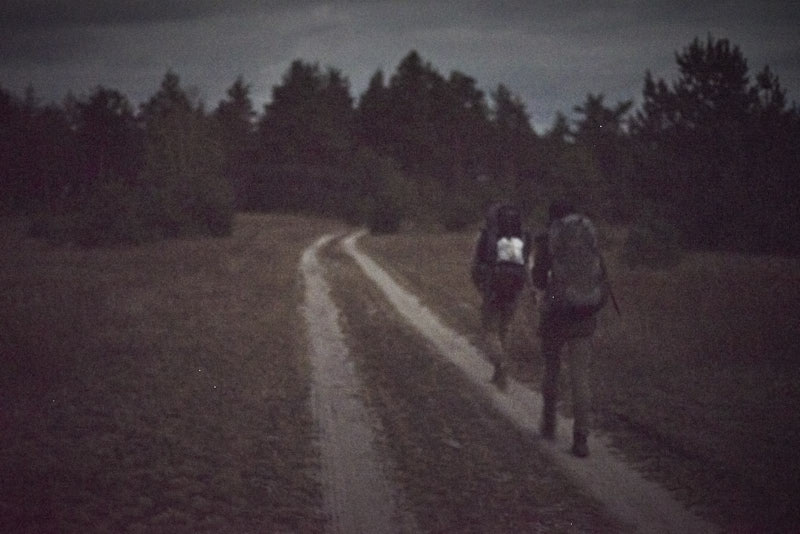
1 Zamoshnya
We’d been moving quickly and quietly in single file, sticking to our planned route north east, straight through the woods on a small 4×4 track that snaked through the groves of pines. Ahead of us across a field of knee high grass lay the Zlynska, and hopefully some point shallow enough to cross.
To ensure we’d not been followed, we made another brief rest stop, hunkering down in the long grass by the river bank and waiting for a few minutes to watch. It is at this point that many people’s luck runs out, and soldiers have been known to wait in the bushes here all night looking out for headlamps and the flicker of cigarette lighters amongst the long grass and reeds. It’s not just people like us, or ‘Stalkers’ the soldiers are trying to keep out (local term for recreational trespassers into the zone after the 1979 Andrei Tarkowski film).
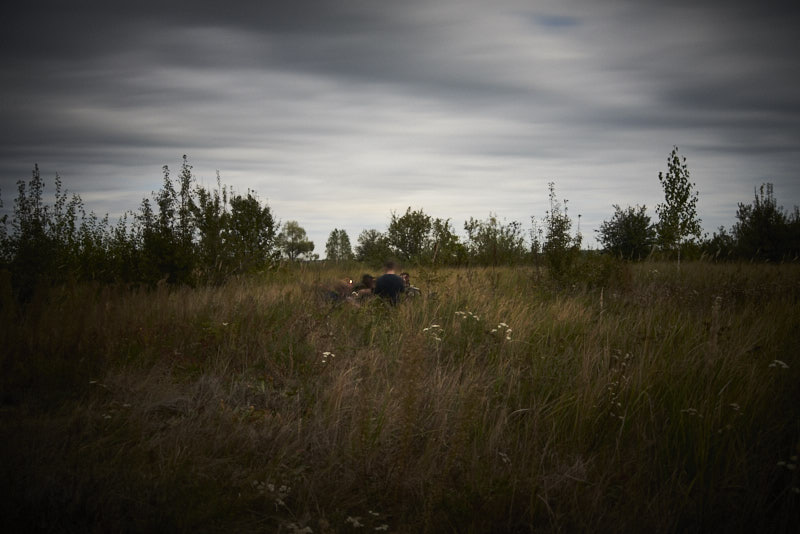 Metal theft and poaching present a significant problem for the Ukrainian government, with tonnes of radioactive metal and meat being taken from the exclusion zone every year and put back into circulation in the post soviet states. The penalties for the unauthorised removal of anything from within the zone are serious. Faced with 5-10 year prison terms, the poachers and metal thieves will stop at nothing to ensure they aren’t caught. They’re often armed, and have been known to shoot over the heads of soldiers and Stalkers who get too close when they’re on the job.
Metal theft and poaching present a significant problem for the Ukrainian government, with tonnes of radioactive metal and meat being taken from the exclusion zone every year and put back into circulation in the post soviet states. The penalties for the unauthorised removal of anything from within the zone are serious. Faced with 5-10 year prison terms, the poachers and metal thieves will stop at nothing to ensure they aren’t caught. They’re often armed, and have been known to shoot over the heads of soldiers and Stalkers who get too close when they’re on the job.
We lay in the undergrowth for some time, initially scanning the bleak horizon like a pack of merecats, speaking in hushed tones and keeping our lights low, although it didn’t take long before we relaxed. Lighting cigarettes and passing the time laughing at each others daft adventure stories.
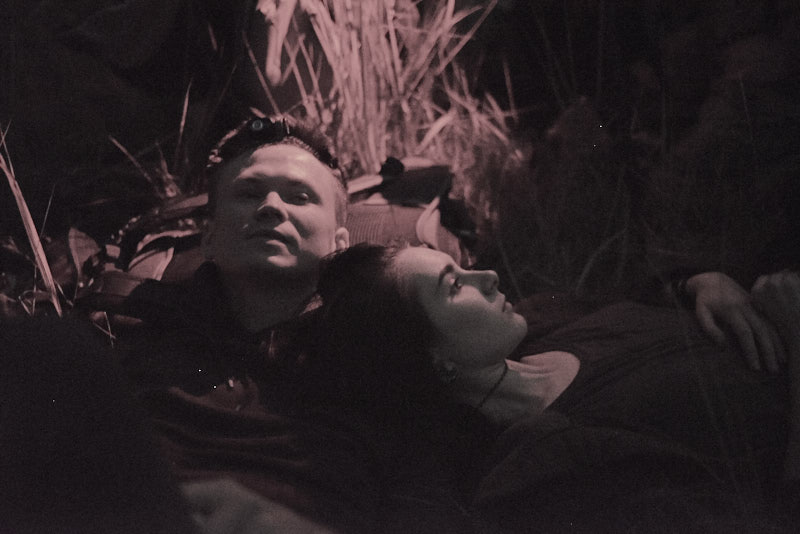
For a short stretch next to the point at which we exited the reeds, the river looked just about crossable. It was a shoes, socks, trousers off and pull your underpants up to your knackers job, but crossable none the less.
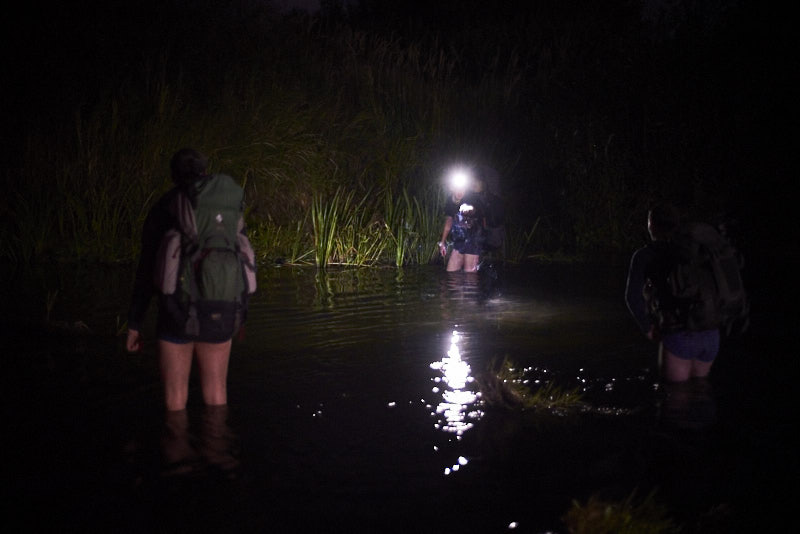 Just under the water line lay a long fallen tree, that had allowed a small bank of silt to build up in front of it, and one by one, we were able to use it, just, to make it across the Zlynska without getting a total soaking. I reached the far bank and the General greeted me with a grin.
Just under the water line lay a long fallen tree, that had allowed a small bank of silt to build up in front of it, and one by one, we were able to use it, just, to make it across the Zlynska without getting a total soaking. I reached the far bank and the General greeted me with a grin.
‘Welcome to The Zone’, now put your pants on.
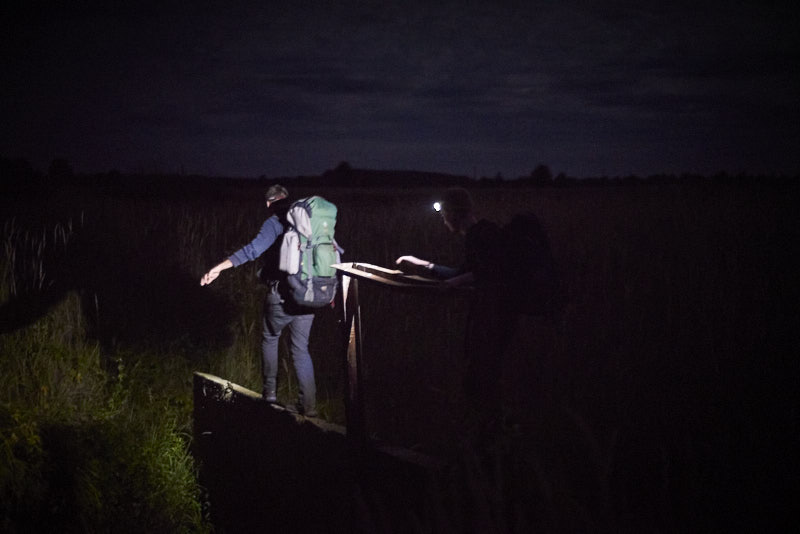
We were on the edges of what must have been a huge farm. As we scurried up the river banking we were immediately confronted with the remains of a huge network of irrigation channels and sluice gates which even after 30 years still stood strong amongst the untamed growth of whatever used to be the tended crops here. We tiptoed over the gates and channels and worked our way through shoulder high wheat and grass, past collapsing cow sheds, stables and green houses on our way to the abandoned village of Zamoshnya.
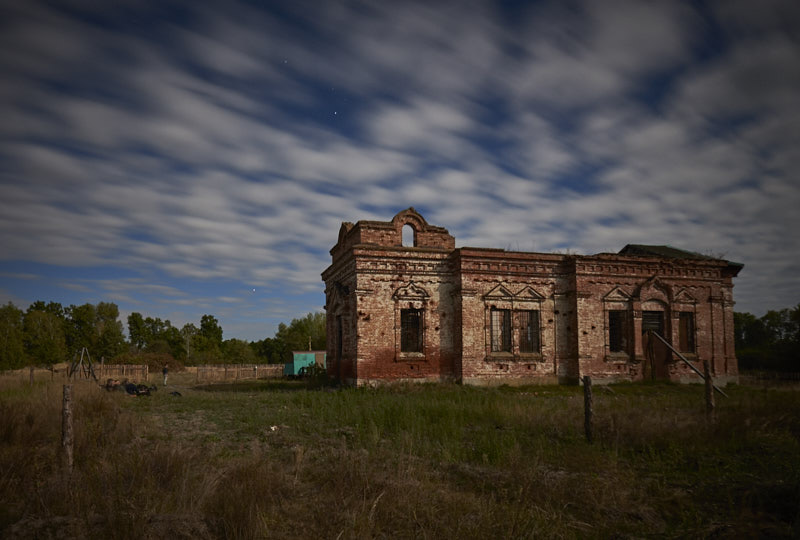
There isn’t much left here. A solitary church, a few houses and a bus stop are all that remain, but it’s these bits of everyday village life that seem to stand apart from the more ‘iconic’ structures in Pripyat, which have become reluctant architectural celebrities under the lenses of tens of thousands of photographers over the past decade.
We took another rest stop and ate some salo with vodka, a brilliant Ukrainian snack which is basically pig fat, salt and herbs wrapped in paper.
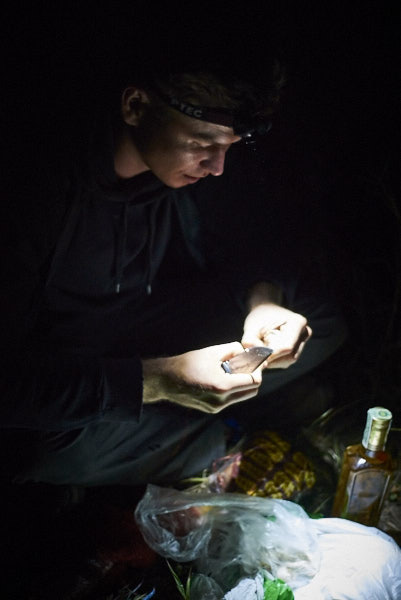
We were still 20km from our intended target, but from now on we could leave the overgrown wheat fields behind and begin to move along the old roads of the Pripyat municipal district. There is a curfew imposed on vehicular traffic in the exclusion zone that lasts from 7pm-7am with a single early-morning worker bus on the main entrance road being the only regular exception. Out here, where we were in the deep south of a relatively obscure section, we could expect to move with complete impunity.
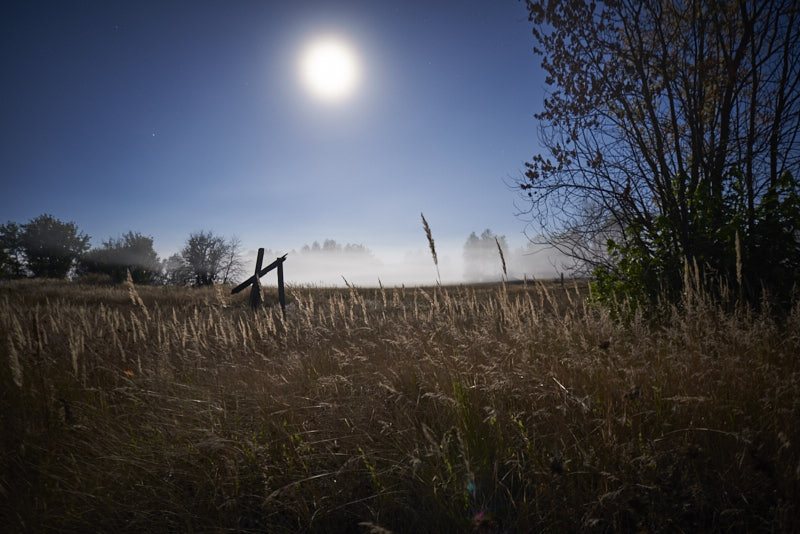
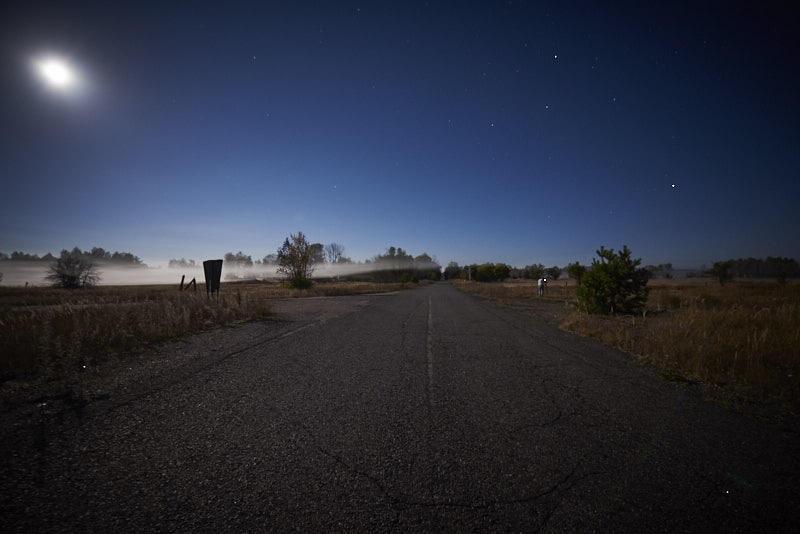
The clouds had begun to recede, and under the strong light of the full moon the fog that had started to form on the wheat fields coalesced with the pitted asphalt and rotten road signs into a picture perfect amalgamation of a 1000 video game and movie scenes.
We trudged onwards.
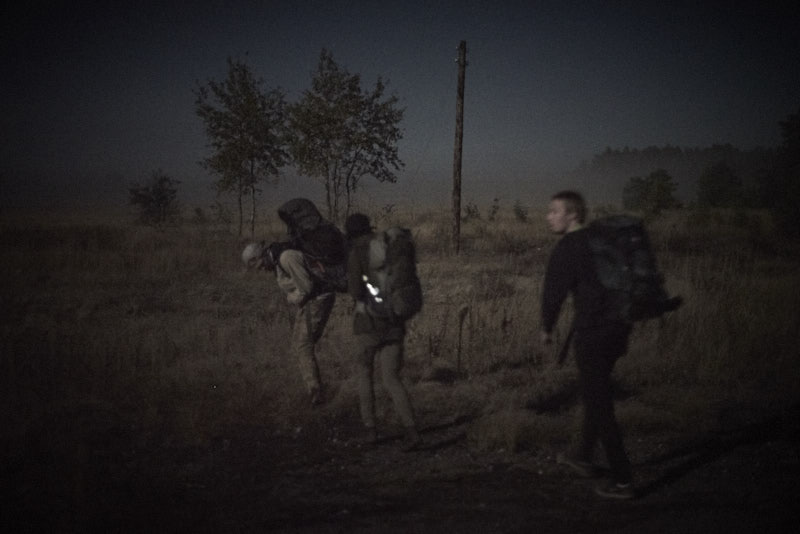
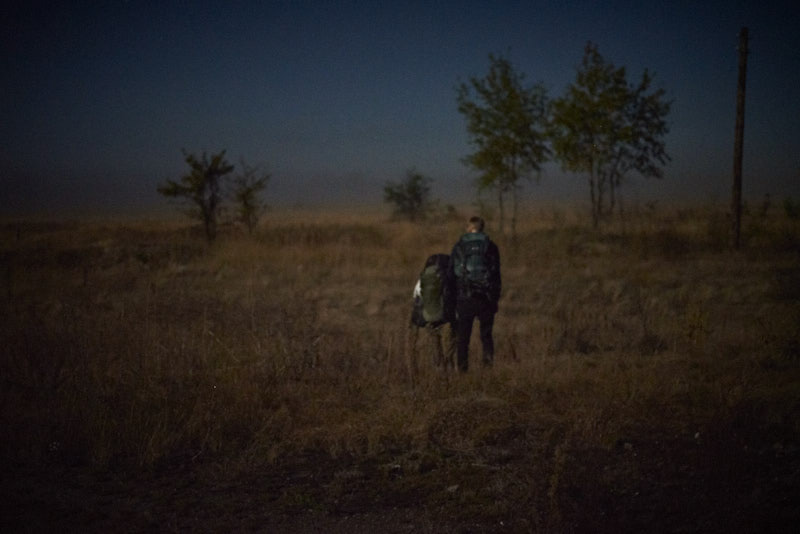
2 In The Dust: Christogalovka
As dawn began to break, we were stopped dead in our tracks after noticing a large object about 500m ahead of us, blocking the entire road. We were extremely close to the under construction Vektor Radioactive Waste Storage Facility, and wanted to remain very low profile in this area, especially now the sun was coming up. The Monkey pulled out his monocular and had a closer look.
“Horses!”
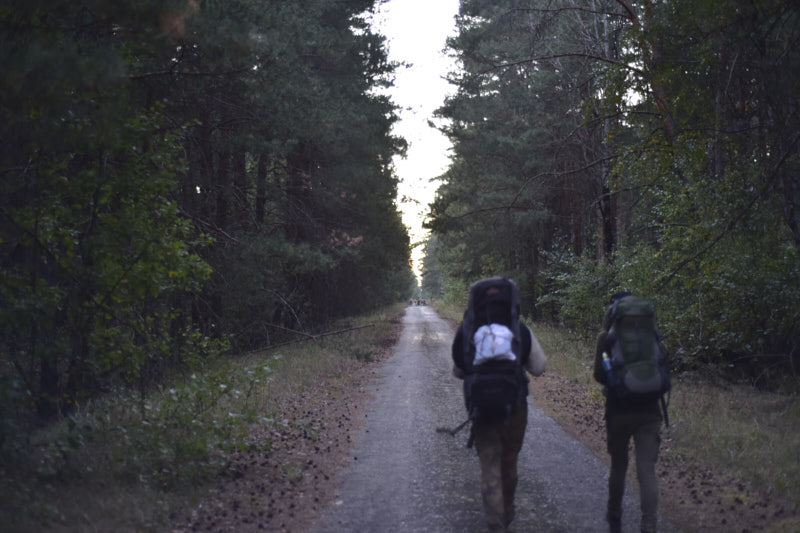
It was our first proper look at some of the real wildlife in the zone. As we moved on closer to them, they began to scatter, tearing off into the trees to the right away from us.
It was high time we got off the road. We’d been awake all night, and in a hours or twos time the roads would be buzzing with the zones work force beginning their shifts and going about their days duties.
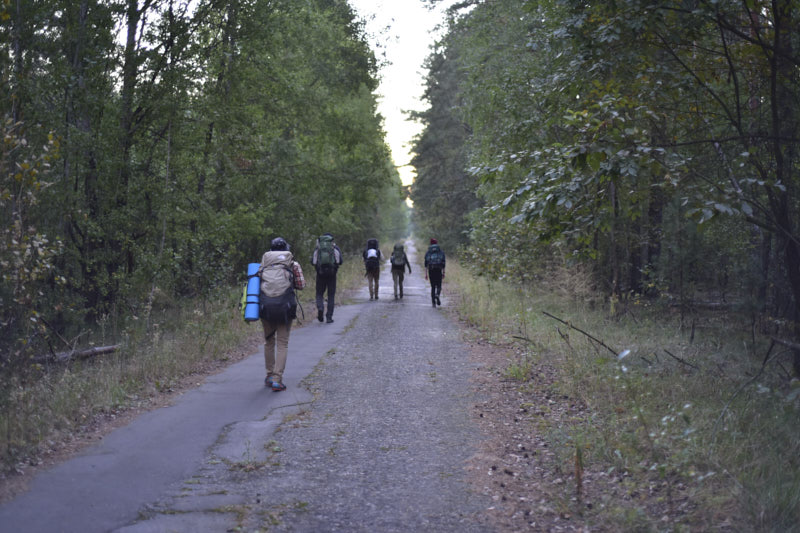
Our lodgings for the day were at the village of Christogalovka. It was badly hit in the disaster, so bad in fact that the response to dealing with the radioactive buildings here were just to bury them. Most of the village is now under tonnes of earth, and all that remains is a single war memorial, still maintained with fresh flowers and a handful of farm houses of increasing radioactivity.

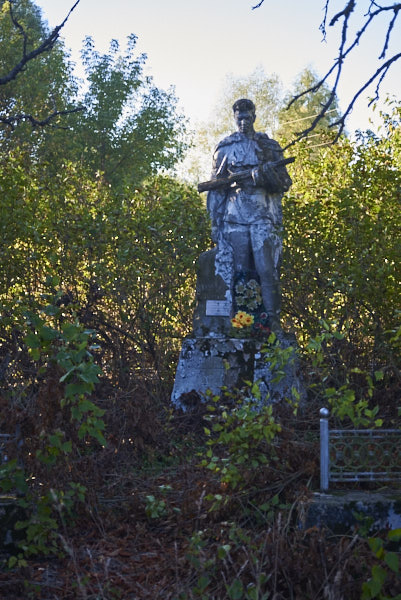


The first candidate with inspected actually turned out to be a decent choice. Measuring about 5 uS/hr inside the house (they’d obviously closed their windows and doors after the reactor explosion) we figured we wouldn’t do any better than this, and threw down the packs into the dust and got the stoves on. It was amazing to finally get a brew and a plate of warm food (washed down with a nip of vodka, of course).
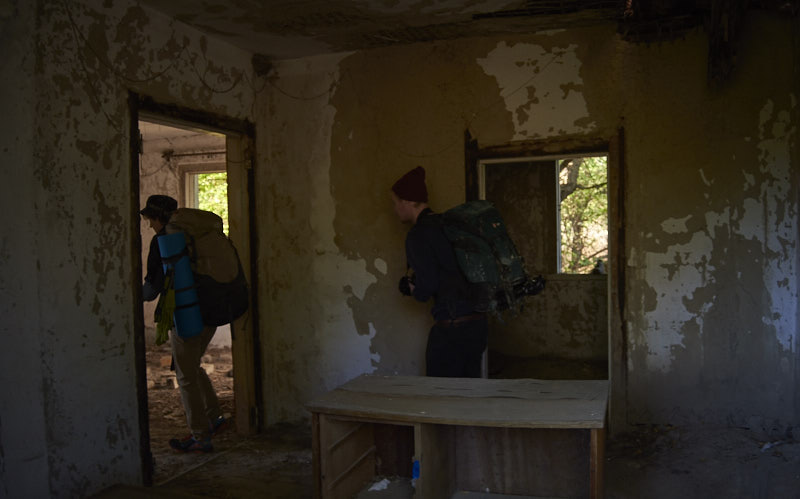
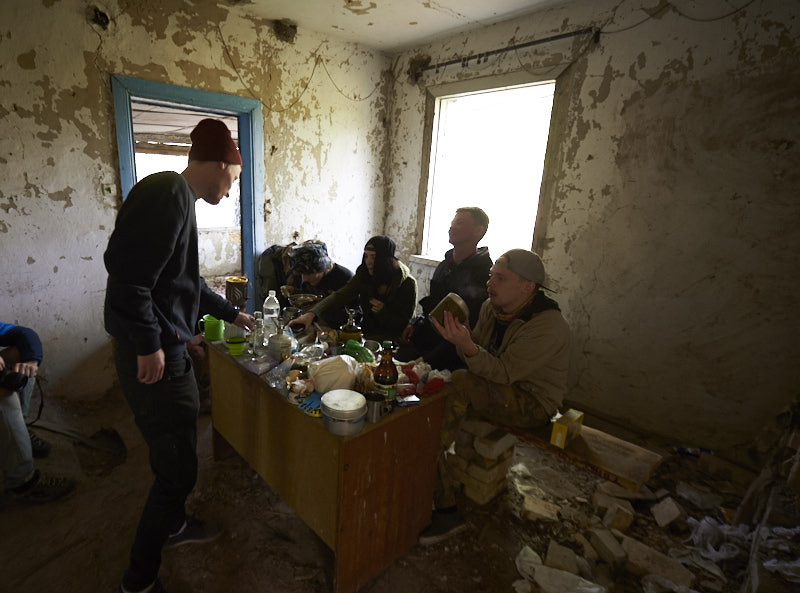
The others got to work on clearing the dust off the floor in one of the back rooms to lay out their roll mats on, which after spending about 2 minutes in there, I opted to avoid and looked for somewhere to string the hammock.

Scharfrichter had the same thought, and as i’d just gotten comfortable in the perch i’d found rigged off door frame and adjacent window, she skipped past me out the back window, climbing up an adjacent tree and hopping through an open door in the roof space.
I was a bit gutted I’d not thought of that myself after all the faff I’d undertaken stringing up in this slightly precarious perch, but I was plenty comfortable and drifted off..
.. only to be woken half an hour later to the noise of her coming back down.
“Is it ok?” I asked with one eye slightly open
“No. she said, replying in that ultra directed inflectionless English that only Russian speakers can properly do.
“Extremely radioactive”
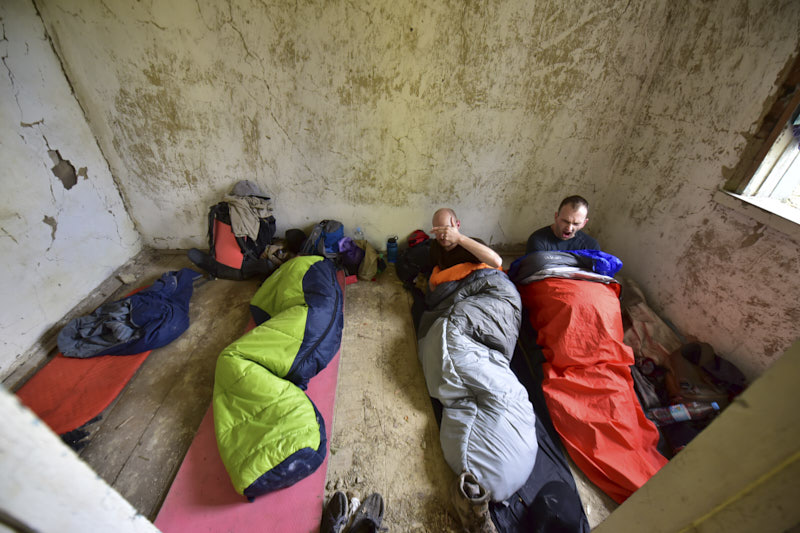
By the time we awoke, most of the day had past. We had a couple of relaxing hours in the farm house making a bit of breakfast and having a natter while we waited for dusk to fall. Being only around 4 km from the Pripyat city limits we could afford to wait until 8 or 9 before we set off, although we had a very full night ahead of us and didn’t have too much time for slacking. The main priority was finding somewhere we could call home for the next 3 days, ideally a flat or some kind of house we could hold up in which would be far enough off the beaten track to avoid discovery by tourists, the army, other stalkers or poachers. Being an entirely abandoned city, you’d think this would be easy, but with the horrendous structural state of some of the buildings and the amount of horrible dust from decaying plaster board and asbestos paneling found in most of these places (as well as the latent radiation), wouldn’t turn out to be as simple as you might think.
3 Location Location Location
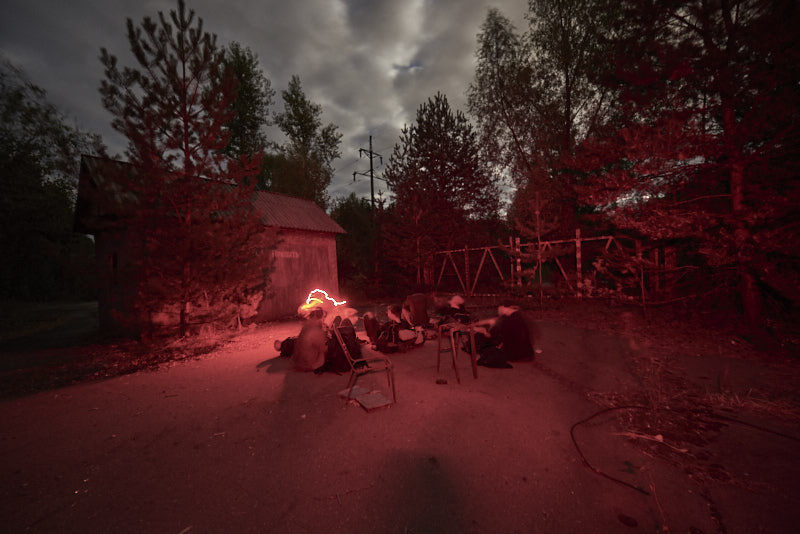
We auditioned a few candidates in a group of dilapidated detached houses far away from the main concrete blocks of the city, but had no luck. Each one with either in a dangerous state of disrepair or humming with radiation, and the ones that were free of dust basically had no roof. We quickly gave up on finding a ‘quiet house in the country’ and moved towards the city centre.
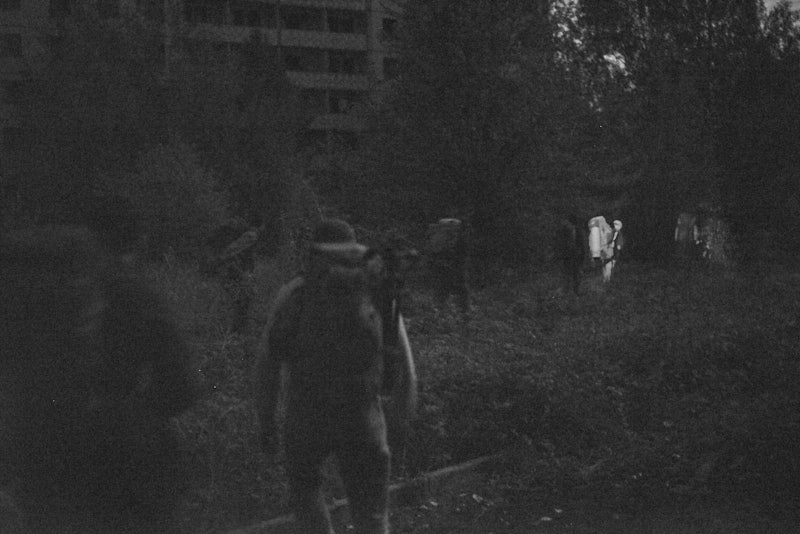
We also needed food, but thankfully, we had a well laid plan for that.
As luck would have it we had a man on the inside, who had concealed a selection of lucky-dip food stashes at a few hidden locations in the city whenever he got a break from his day job of guiding tourists around Pripyat. As we were now moving to find a place to kip within the city limits, we figured it would be a good use of time to grab one of these stashes on our way to our new digs in one of the apartment blocks.
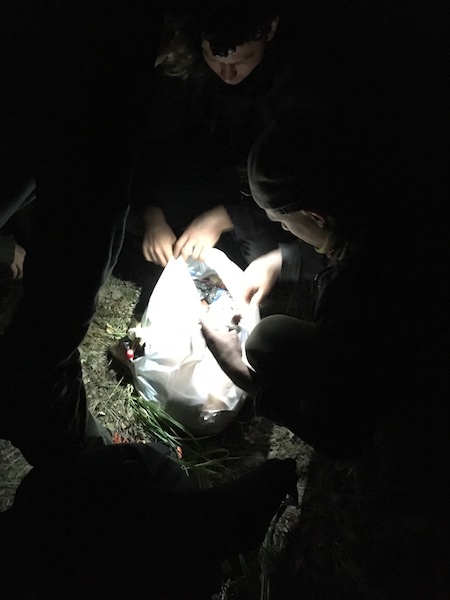
The first stash we found was an absolute haul. A bottle of chilli vodka and some packets of meat and pasta, which more than made up for the fact that the second one we went to search for had been nicked by poachers.

Our search for an apartment saw us inspect a few buildings, most of them sporting ‘stalker traps’ at the entrances – random bits of metal in the doorways to be tripped over to indicate disturbance, placed there by the military police to catch out squatters. Like the farm houses, we had to look through a few before we found a decent spot, but eventually came to the 9th floor of a mid-rise apartment block, with a room that looked half decent.
The floor was insanely dusty, which prompted everyone to go and kick a few front doors off the adjacent apartments to use as beds. I couldn’t be arsed, and looked for a decent place to string up the hammock.
As I was by the window looking to sorting out one of my hammock anchor points I saw a green laser bouncing around the trees and dark buildings of the city. It looked like it was coming from about 2km away, from the roof top of one of the other abandoned tower blocks. The others saw it about the same time, and we all leaned out the window trying to work out what on earth was going on.
“Stalkers.” Oleg suggested, and reached into his pocket, pulled out his own laser and started shining it back. The operators of the other laser immediately locked on to our position and began painting our building with bright green light.
The ultimo stealth ninja in me was utterly bamboozled. As if it weren’t enough for these other pilchards shining a LOOK THERE ARE PEOPLE IN THE CITY beacon to every board guard manning a sentry post, now we were shining back and giving both of our precise positions away. Their game of laser-tag-footsie came to a natural end, and Oleg mumbled some word in Russian and headed out the door with Scharfrichter in tow.
The General sat down and got comfortable, in a way signifying he was going to be there for a while, and unscrewed the cap on the chili vodka.
“They’re going to talk to them”.
On their return over an hour later, we learned that they were indeed other stalkers who’d been in the zone for 2 days. They were pissed as sailors and out of food, and their plan for a get-out was just to walk up to a guard post and get arrested to save the walk. You can only shake your head.
Time was getting on, we needed to find some water and fancied a walk round before the sun came up so threw a few essentials and some empty bottles into our bags and headed out.
4 Plutozade
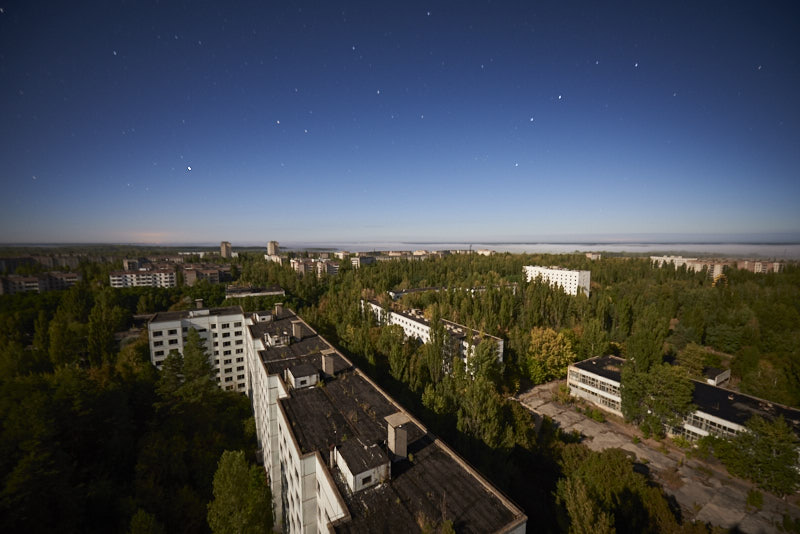
The city, under the blanket of stars and full moon was mesmeric. An occasional chorus of wolves howling somewhere out in the vast expanse of pine forests and the crunching of the cracked asphalt under our feet were the only things that punctuated the silence.
We meandered amongst the towering concrete buildings without much direction or intention, and were taken by surprise when we were greeted by that exhausted pin-up girl of post apocolyptica, the Pripyat ferris wheel, towering above the old fairground looking like a familiar 3D render.
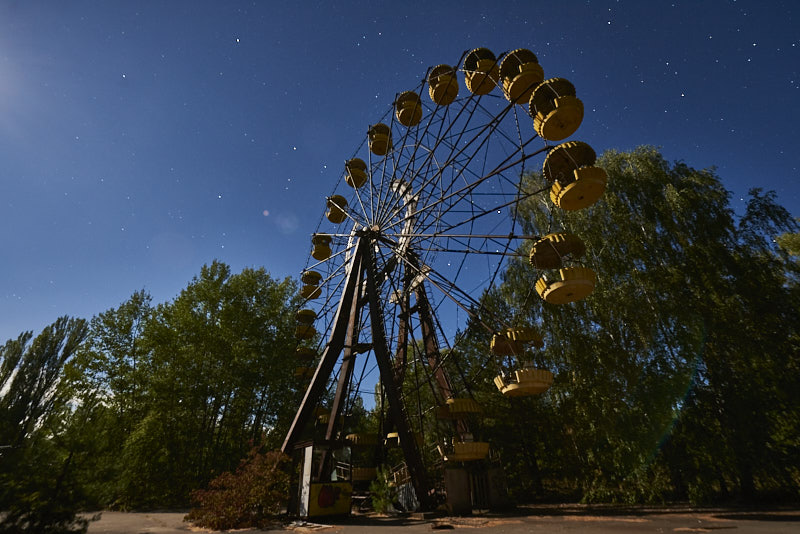
We popped by a couple of the points of interest around the city, including the old post office with the mural of the cosmonauts, before heading up to the roof to drink a beer and view the giant nuclear Anderson shelter of the New Safe Containment reactor housing, perched, glowing with activity on the horizon.
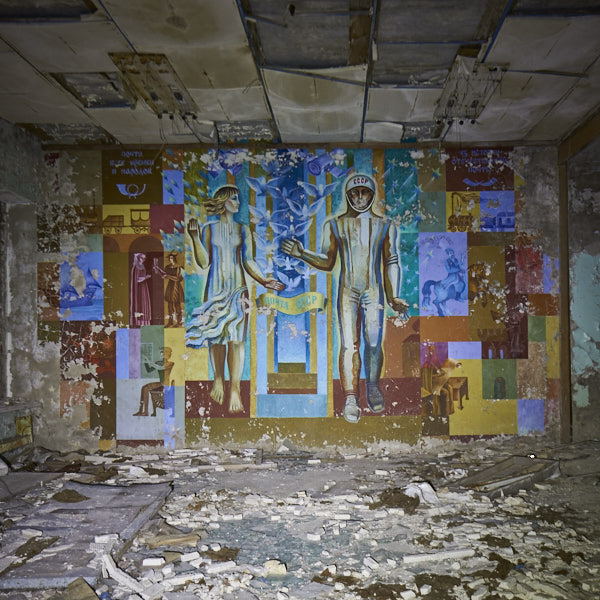
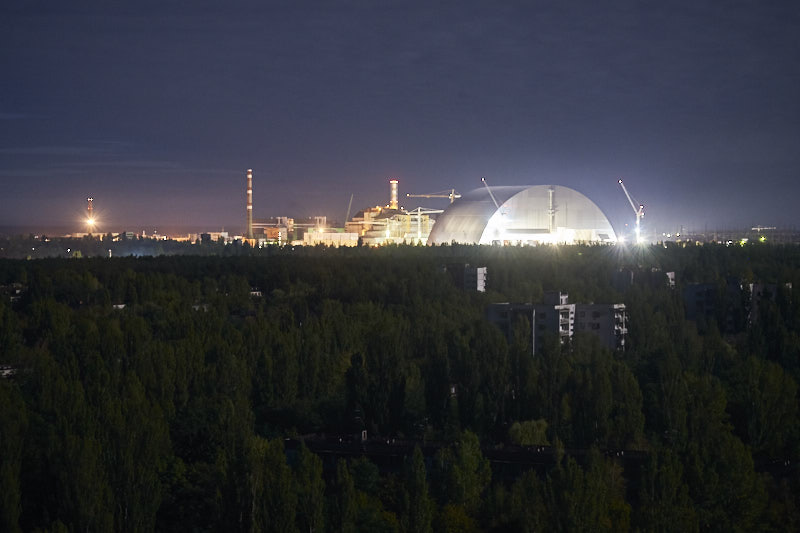
Purportedly the worlds biggest moving building, the whole thing had to be built 180m away from the collapsed reactor 4 to avoid irradiating the workforce. Upon completion, it would be slid on rails towards the old reactor building and provide a weather tight containment for the tonnes of radioactive waste in and around the reactor building for the next 100 years. Go watch the BBC doc on it:
http://www.bbc.co.uk/programmes/b08650s6
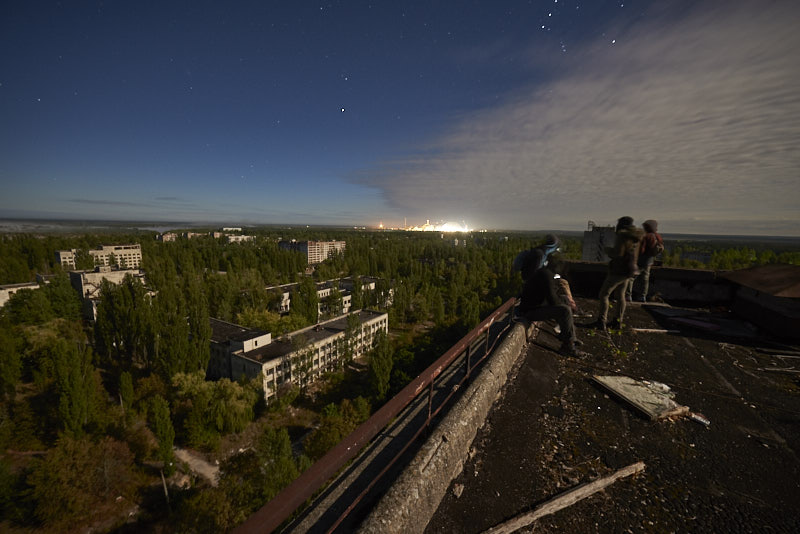
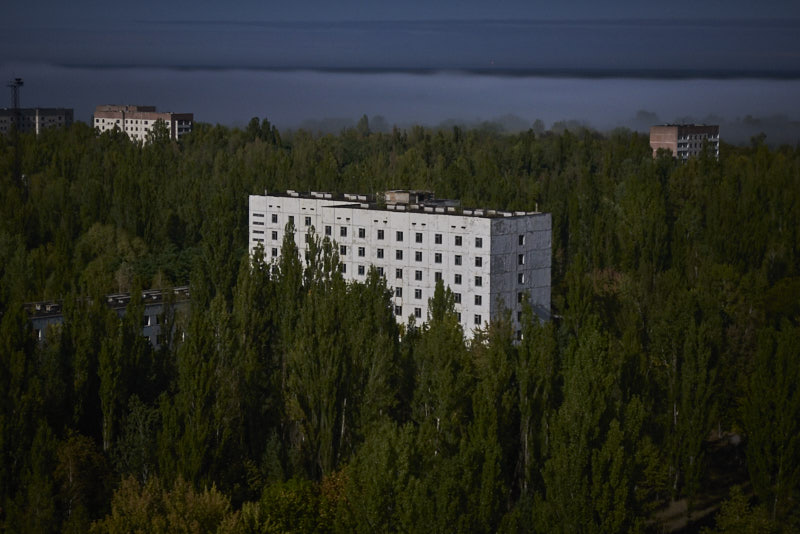
By the time we’d finished on the roof, it was only an hour to light and we made our way across town to our water source.
Our grand plan for water, and you’ll have to stick with me on this, was to fill up the plastic bottles we’d accumulated with water from a flooded cable tunnel underneath an old electronics facility on the edge of the city, and clean it with some $10 filters we bought in a camping shop two days before. The water we were to collect had accumulated from the rain in the two decades since the factory was abandoned in the mid-nineties (they used it well after the disaster to produce the robots for the decommissioning) and if we were diligent with the filtering of the water we were to collect, potable, probably non-cancerous water was an achievable prospect.
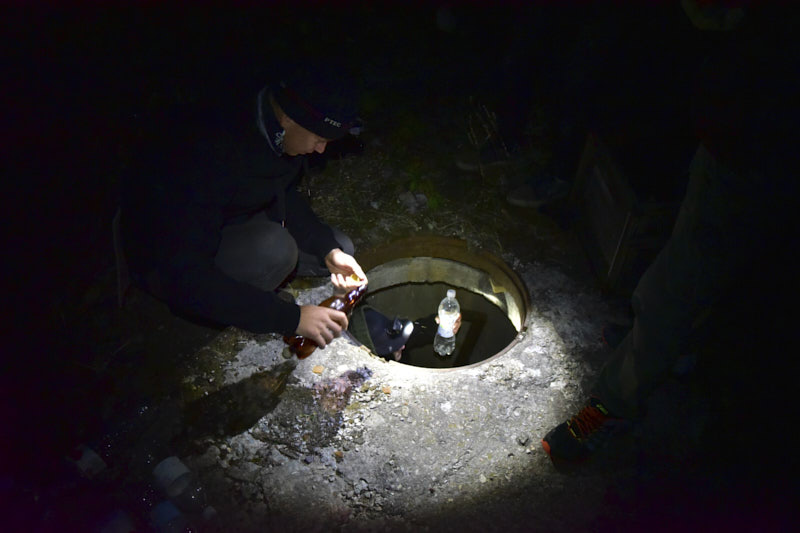
Before I was to drink standing water from the bottom of a manhole in the most highly contaminated radioactive disaster zone on the planet, I took a bit of convincing. Americium, plutonium, strontium, caesium, the primary elements whose isotopes were ejected from the reactor explosion, are all water soluble, and crucially, alpha radiation emitters. They bare a strong chemical resemblance to calcium if ingested, and tend to get taken up by the body and absorbed into the bone structure where they will reside for the rest of your life, emitting one neutron at a time, steadily increasing your risk of bone cancer.
While a good deal of the plutonium, strontium, caesium has decayed away to more stable isotopes, there is still plenty of the hot stuff left, and the americium that results from the decay of plutonium has a half life of around 240 years, so if you can avoid drinking any of that you’d probably be onto a good thing.
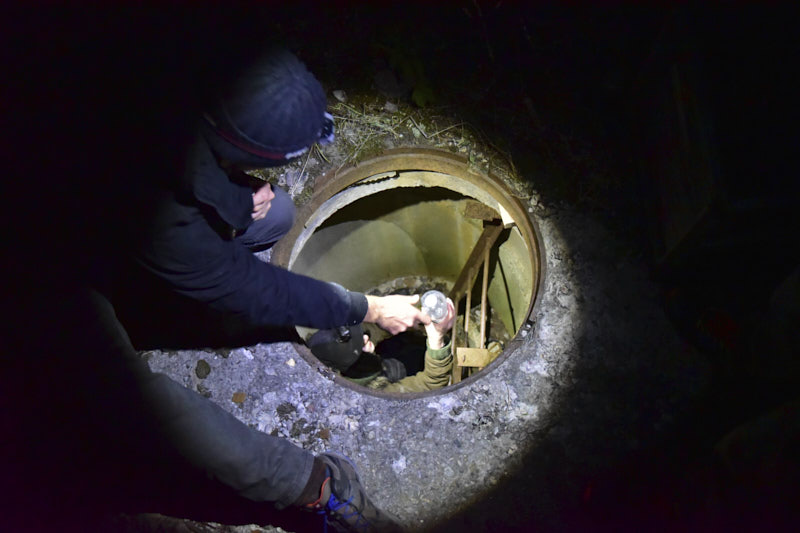
On returning to the flat with our haul, we pulled the plastic-wrapped water filters we’d bought from a camping shop 2 days earlier from the packets, and screwed them onto the bottles containing the sump water to begin filtering. I still wasn’t convinced.
The General pulled out his radiation meter and wafted it about near the bottle of filtered water to convince me it was probably OK. That’s no good! I laughed. Alpha is readily absorbed by water so it wouldn’t even show up on that if you’d dropped a new fuel rod init! We discussed the pros and cons of what we were about to do, well, not really discussed, I just monologued him in fast english while I tried to work out if we were all about to drink cancer juice or not.
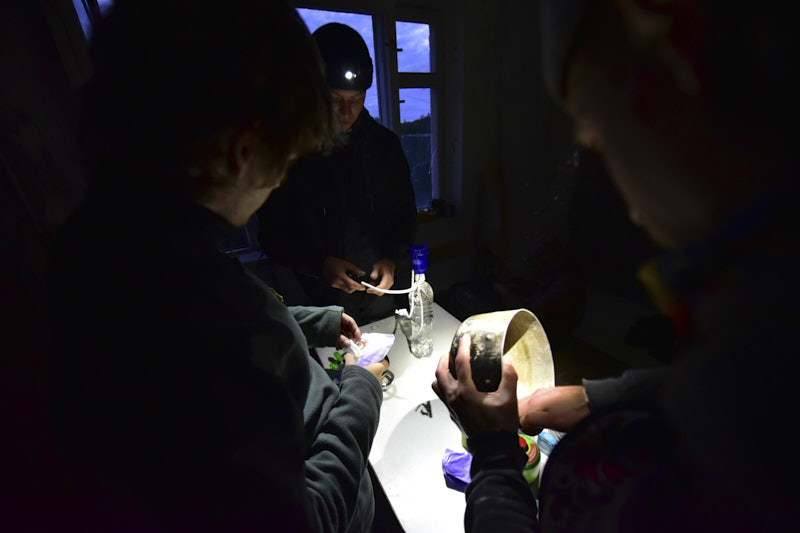
On the plus side, the Jupiter factory, where we obtained our water, was cleaned quite thoroughly for the factory staff to keep working there while they built the robots for use in the reactor cleanup. The cable tunnels and surrounding streets would have been cleaned well, and by the time rain water and snow melt would have started to leak into the tunnels in the 1990s, most of the horrid surface dust would have been long gone. The reverse-osmosis filters we had, according to the UN, are the best things to use when trying to purify water where heavy metals might be present (such as battle fields where depleted uranium shells have been used), so that was a plus.
On the down side, we were still about to make super noodles with Chernobyl drain water.
After i’d finished talking to myself, the General just shrugged.
“Hmm, OK. But you also don’t have any choice hehehehe”
I still to this day, don’t know why we didn’t have a few litres of clean water in all those food parcels we had dropped off.

We made our meals as the sun came up over the city, and climbed into bed for a few hours rest.
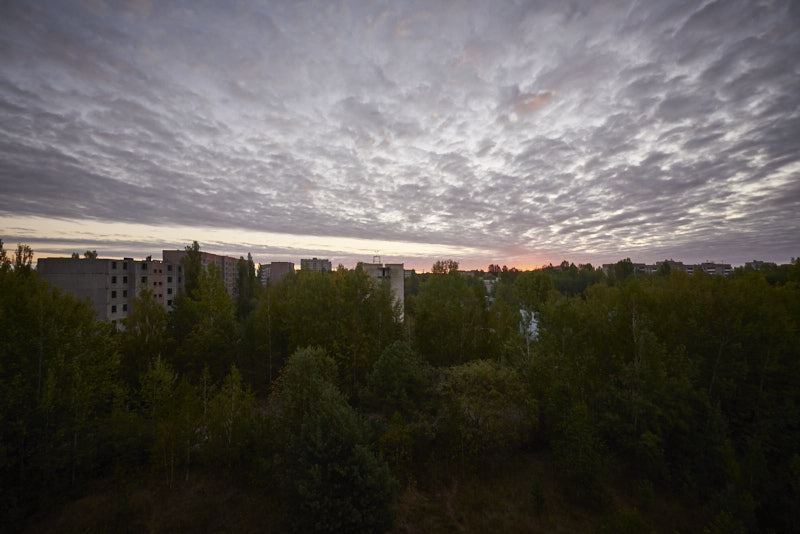
5 Pizdetz
Autumn in Pripyat is absolutely spectacular. The vibrant colours of the trees that have overgrown through and around the dull grey faces of the abandoned buildings present the kind of timeless juxtaposition not dissimilar to that present at the dilapidated abbeys in the North of England in the last months of the year. Spectacular as it was, heading out into the city in daylight was risky business. The chances of bumping into patrolling soldiers, police or simply other tour groups who could call you in to their handlers was much higher than if we’d stuck to the darkness. We tiptoed toward every crossroad and junction, craning our necks out as far as they would go in the hope of preemptively spotting the black UAZ patrol cars that watch over the long lanes that intersect the city blocks.
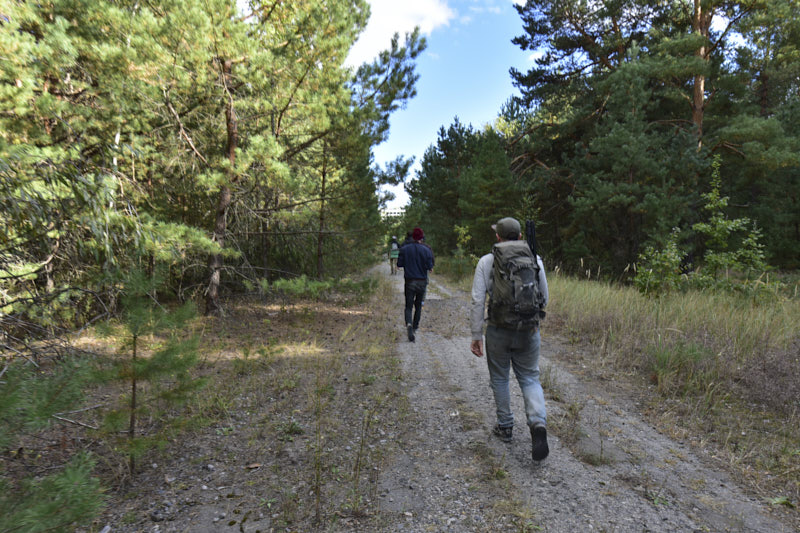
Having made it back to the Jupiter factory for a look round in the day time, we did indeed bump into another tour group of Ukrainians, being shown around by the fella who’d kindly dropped off the food parcels in the weeks preceding our visit. It was nice to see him and offer a few words of thanks, and on his advice we stashed our bags in the bushes to try and look as if we’d just jumped off the tour bus ourselves.
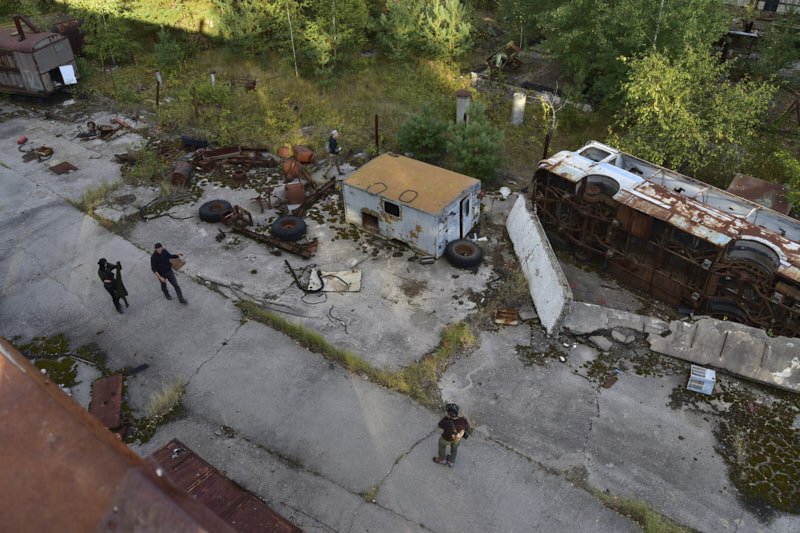
The tourists he was minding looked quite confused when we barged in chomping lion bars and chatting away at the top of our voices into the main factory hall. They was around a dozen of them, carefully stepping over the broken glass and rusted metal in their trainers snapping pictures of the various artefacts littered around the place on point and shoot cameras.
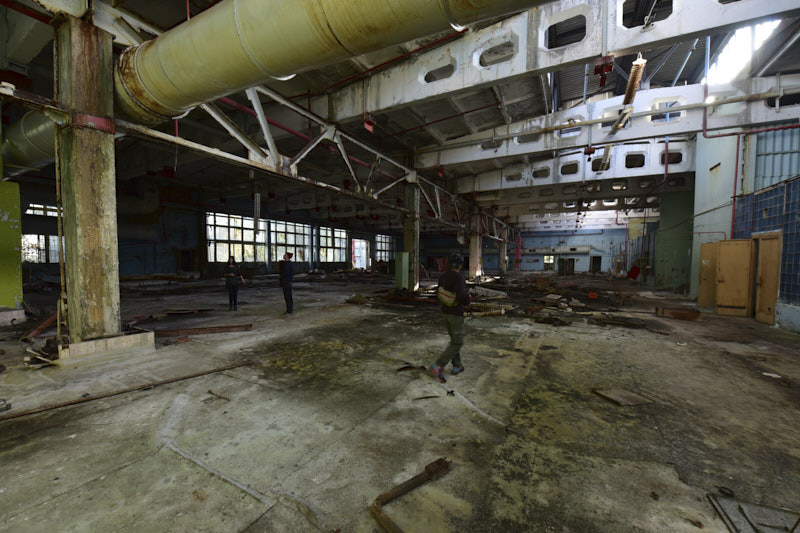
Not one of them said a word to us, but I have a feeling they might have said something to their driver as they got back onto their bus.
We heard it before we saw it.
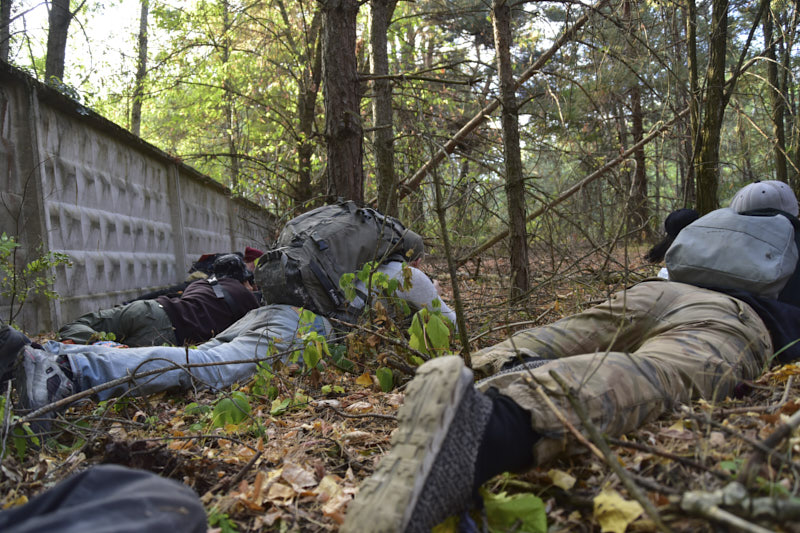
A black sedan smashing it round the corner in second, obviously looking for someone. Undoubtedly us. We all dived into the bushes at once and hit the deck as it flew past us onto the neighbouring street. We had to stay off the roads now, so ran through some nearby buildings and, ironically, into the old police station where we thought we could stay undetected for a few minutes. We used the opportunity to have a dig around the place, locking ourselves into the holding cell for a daft photo and hearing a slightly unnerving tale from Oleg about a group of tourists who’d done the same thing, but ended up stuck in there for 16 hours..
Convinced we’d shaken him off, we loitered for a little while longer, only to be somehow seen leaving again by another patrolling car and forcing us to run into the undergrowth and take refuge by a long tall concrete wall bordering an old vehicle storage yard. We were in this wait for the long haul now, they were properly on the lookout for us. Over the next ten minutes or so, we could hear the car firing up and down the side streets trying to find us. I’m sure they knew just as well as we did that they didn’t stand much of a chance unless they got out on foot and started hacking through the birch trees around the abandoned buildings. We all started to relax a little around the 30 minute mark, although there was a healthy separation in levels of anxiety between the Brits and the Ukes. While myself, the Boatman, the Otter and the Monkey were all still on tenterhooks, and with good reason. While Ukrainians mostly get away with a days jail and/or a bribe, I’ve heard of relatively rich foreigners being caught without a guide in the exclusion zone extorted for thousands of euros at the hands of the underpaid police and soldiers that patrol it.
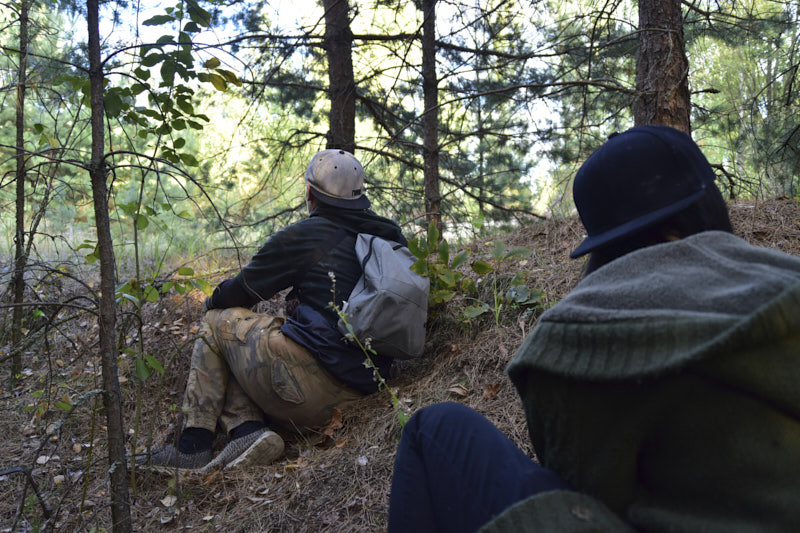
Oleg and the General had started puffing tabs, a move that I was sure was going to attract attention to anyone in the vicinity, and if they’d had dogs…
A van door rolled open.
If the threat of capture by a couple of board soldiers wasn’t enough to give the Ukes in our group a kick up the arse, the barks of the two almost certainly enormous alsatians that had just been loaded out the back of the van we’d just heard certainly was. Oleg bolted upright, his eyes were wide open, and slowly made a dog-mouth yapping sign with his hand. They were extremely close, so close in fact, that the only place they could have been was directly on the other side of the concrete wall we had taken refuge against. It wouldn’t take them long to get on our scent and work out where we were, which meant we had a bit of practical dilemma to contend with.
We all knew that if we stayed where we were, we’d get found in minutes. If we ran, we’d make a ton of noise on the sticks and leaves that littered the floor, and probably get found even more quickly. There was a brief moment of hesitation, and I could see everyone working out the next course of action for themselves, weighing up the merits of facing an angry dog head on or having it gnashing at your ankles as you ran, but was only one decision, and it wasn’t one that involved sitting about.
We began moving away from the wall and through the undergrowth as slowly as we could to not make any noise, but faced with the prospect of being hounded out by those dogs on the other side of the concrete, any chance of being quiet and swift at the same time went completely in the bin. We made such a hell of a racket and the dogs responded almost immediately. With the element of stealth completely gone, the only thing we had on our side was the time it would take for the dogs and their handlers to make it to the end of the concrete wall and back round to where we were sitting. We abandoned any hope of trying to be quiet and ran full pelt at the nearest building, through a court yard, out a back window and on into the bush.
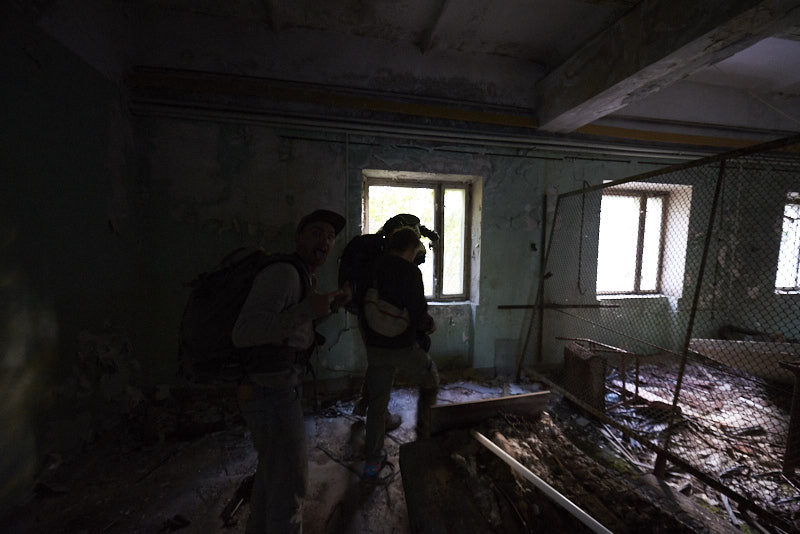
We ran for a good 5 mins solid until we were all spent, and performed a paranoid return route to the flat through the outer layers of the city.
We were now being actively searched for, and there was no way we could get away with having light emirate from our room for another night.
The General, Scharfrichter, Oleg and the Cheshire Cat got some empty water bottles and left in two teams of two to get a food stash and some water. The remaining four of us began scouring some of the other flats, tearing apart wardrobes and cupboards, and pulling wallpaper off the walls to barricade the windows and seal it against light leaks for the nights ahead.
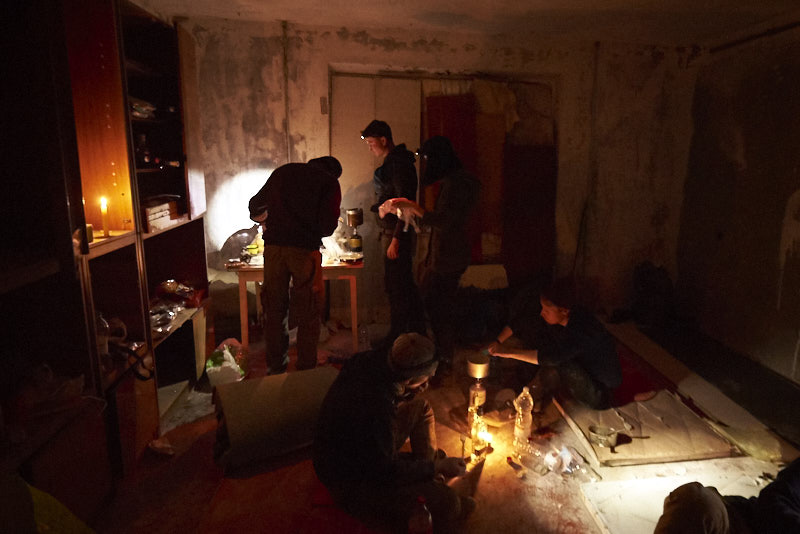
6. A long walk in the dark
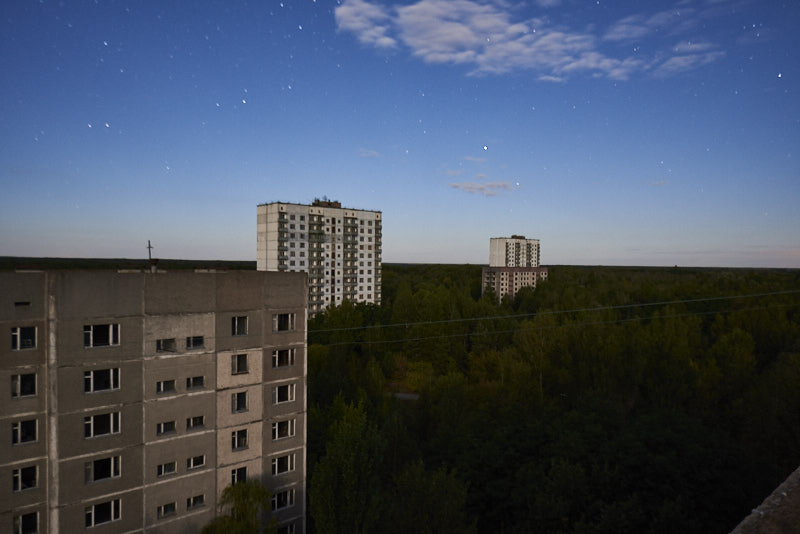
Full of food and reenergised, we set out around 11pm towards the now land-locked harbour at the north of the city. At some point during the clean up operation, the decision must have been made to fill in the lochs and channels that separated the Yanov Backwater from the river to stem the flow of radioactive sludge into the Dnieper further to the south. This once active dockland and pleasure lake is now a completely separated water body, containing the jetty from Cafe Pripyat, the famous house boat and the giant rusted dock cranes.
The little wobble we had with the soldiers and dogs earlier had put a bit of well needed caution into our step, and we moved in absolute silence under the light of the moon. We left the city limits and passed a selection of orchards and old garages, some still containing the rusted hulks of 1980s vehicles, obviously too radioactive to do anything with, but not radioactive enough to warrant cleaning up. Our radiation meter was beeping its warning alarm so much we just had to turn the damn thing off, regularly encountering peaks of 500-1000uS/h in some of the hotter spots of ground. It must have been a psychosomatic reaction, but when you’re in such highly radioactive environments, the air seems to taste different. It wan’t just me either, one or two of the others reported metallic overtones to the taste to the atmosphere as they breathed in.
It wasn’t just radiation around here that was our only concern though, once we had left this patch of toxic scrub land we had to move on up the road and past the main nuclear fuel storage facility, a secure compound just off the main road north which was guarded by yet more dogs.
I could see the ominous orange glow of the compound flashing through the leaves as we paced past the trees, the only source of artificial light for miles. We maintained absolute silence while moving, but as soon as we were in scent or ear shot of those dogs they set off. All we could do was keep pace, cross our fingers, and hope to hell no one came out to investigate.
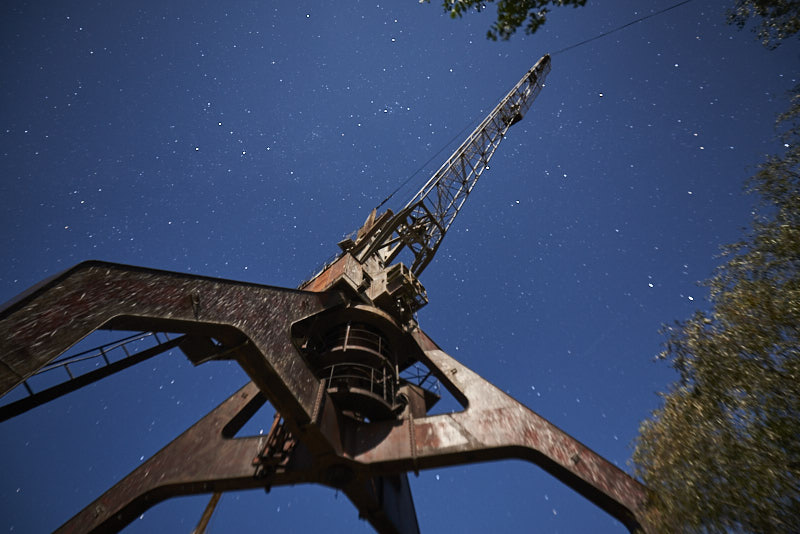
The cranes loom like giant rusted space walkers standing guard over the irradiated backwater. Even after being bombarded by 3 days of Hollywood-perfect post-apocalyptic catastrophe scenes, the sight of a flock of geese in V formation swopping through the mist at water wasn’t lost on me. With the mass of lights from the New Safe Containment glinting away through the trees in the distance, I took a moment to stand on the jetty and take it all in before I got busy climbing.
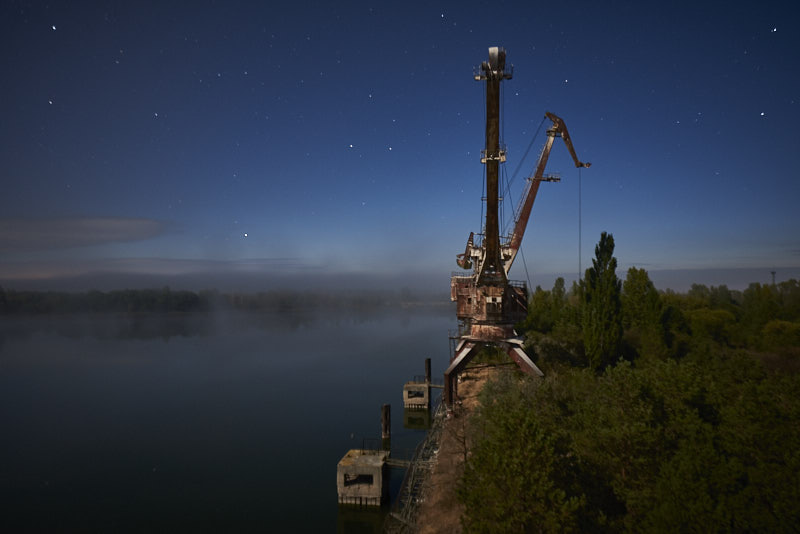
I headed up the second crane to find the Otter at the top looking a bit miffed. The poor lad had just dropped his 200mm L lens off the top of one of the cranes after a fumbled lens change, and smashed the thing to bits on the deck 20m below him, nearly killing the Boatman in the process who was still at ground level. The cranes were pretty horrid inside, with close to 30 years of pigeon shit and machine grease built up on most of the surfaces, but the steel work was in surprisingly good condition.
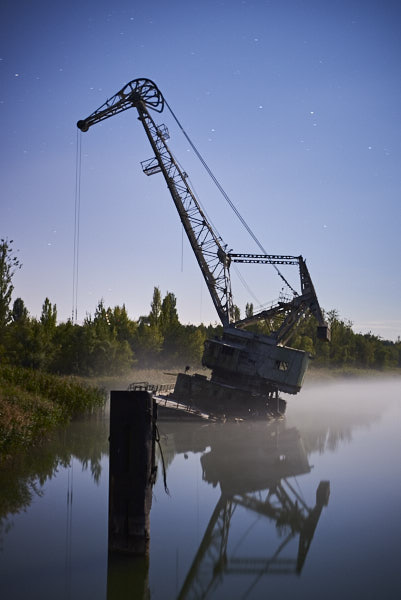
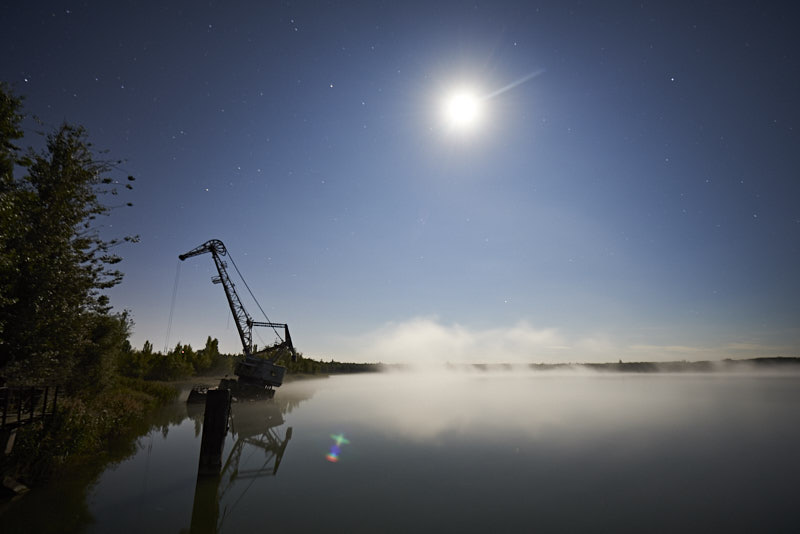
We walked back via the old “Cafe Pripyat” building by the river to watch the sun come up from behind the houseboat and the cranes we’d been climbing earlier.
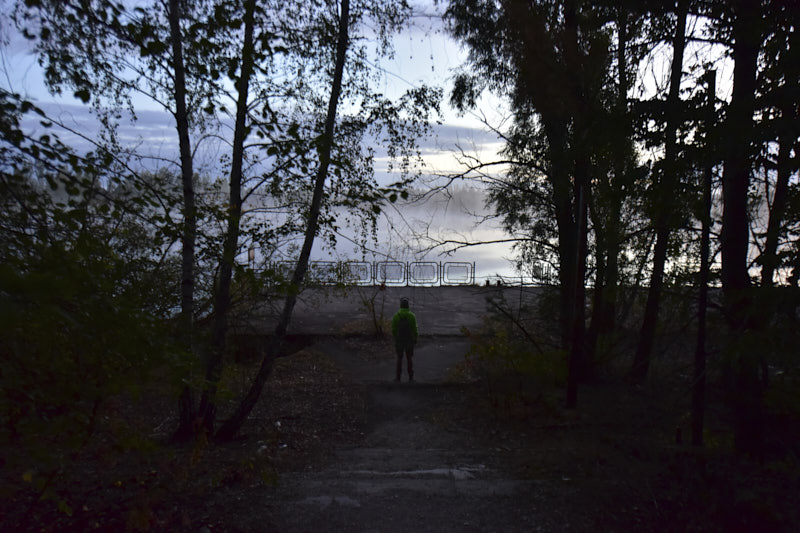
The sunrise was pretty spectacular, but rather than sit back and enjoy it like we probably should, at least 6 of us stood gurning behind our cameras trying to get the perfect photo of the moment the sun *just* made it over the horizon being the boat.
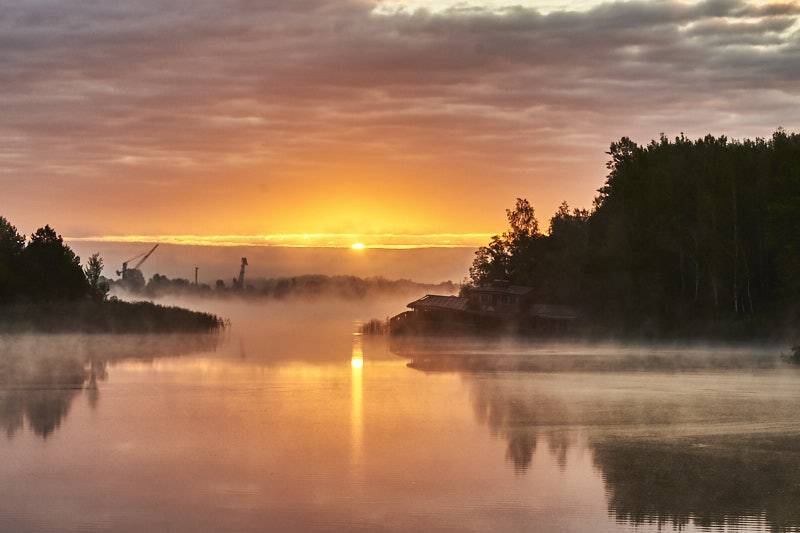
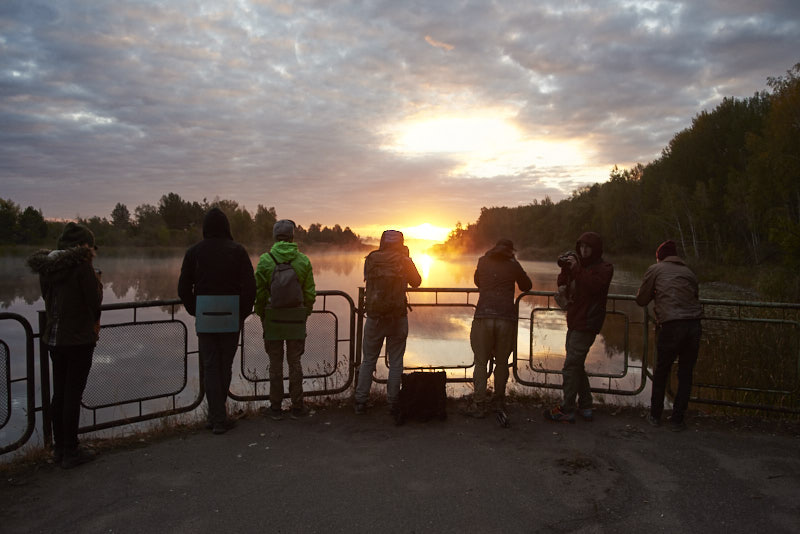
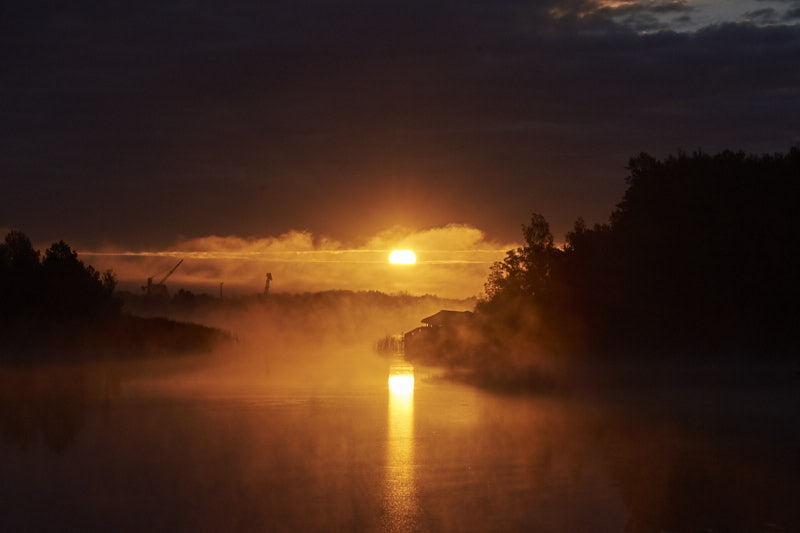
We still had some time before we needed to be off the streets so we hung here a while and went off to explore some of the other famous buildings in the city you’ve undoubtedly seen 100’s of photos from before.
The swimming pool, the “gas mask” nursery, and the hospital.
In the hospital, the General shouted up.
“Hey man, look at this!” waving his geiger counter at something in front of him.
We all huddled round for a gawp. Some nutter had cut off a piece of cloth from one of the 1986 Chernobyl firefighters uniforms and left it on the hospital reception counter, and the thing was reading off the chart. The rest of these uniforms are still in the basement where they originally lay, having been peeled off the dying firefighters after they were brought into the hospital, suffering from extreme radiation sickness after dealing with the fire in the reactor without any kind of protective clothing beyond their regular heat suits. Back in 2011, when I was last in this spot, the stairs down to the basement were still accessible and people would occasionally go down there to find these firemen suits scattered around on the floor in the darkness. The lower stairwells have since been filled with sand to deter people from going down, both for their own safety and probably to stop all of the horrible stuff that still lurks down there from making it back into the outside world, although people still, for some reason, continue to go down there via the ventilation system and just hang out in the latent radiation.
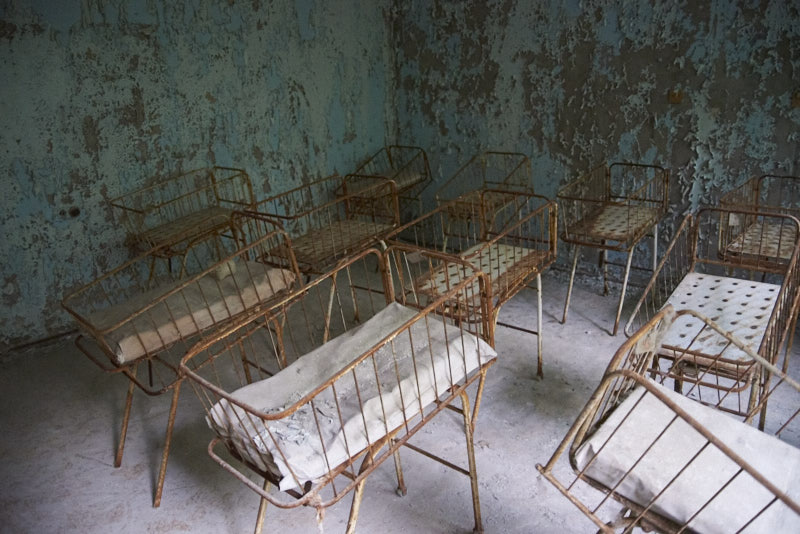
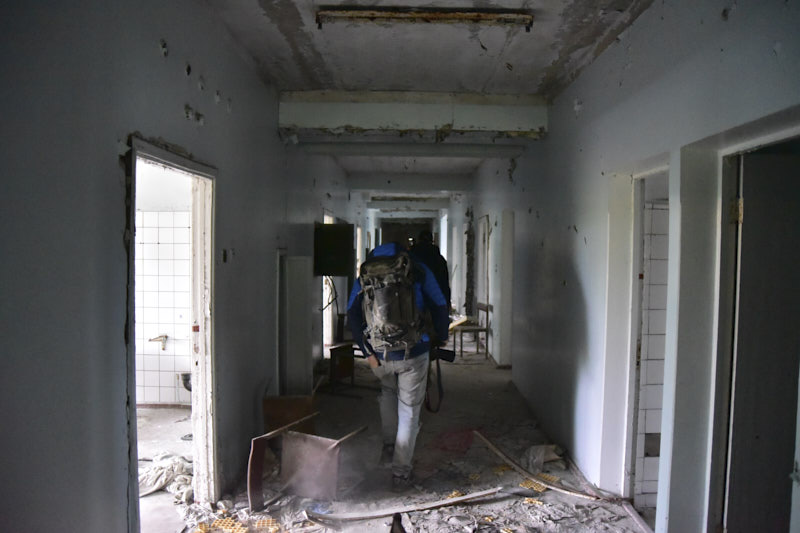



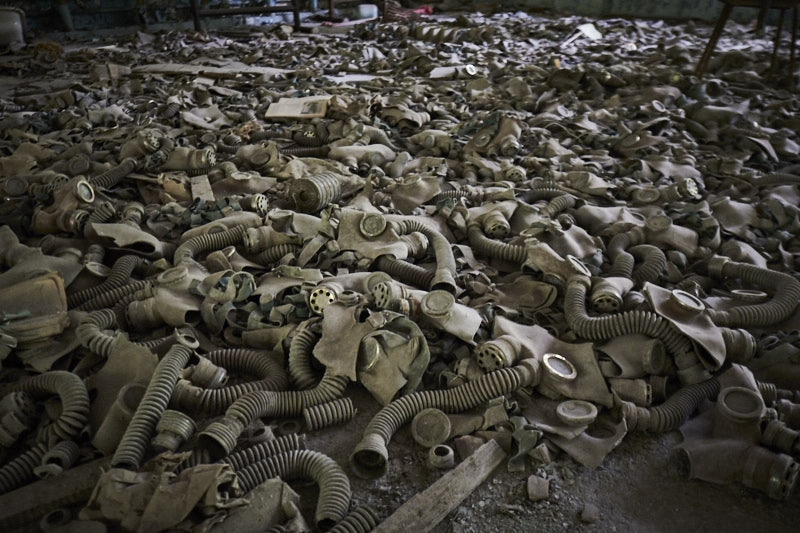
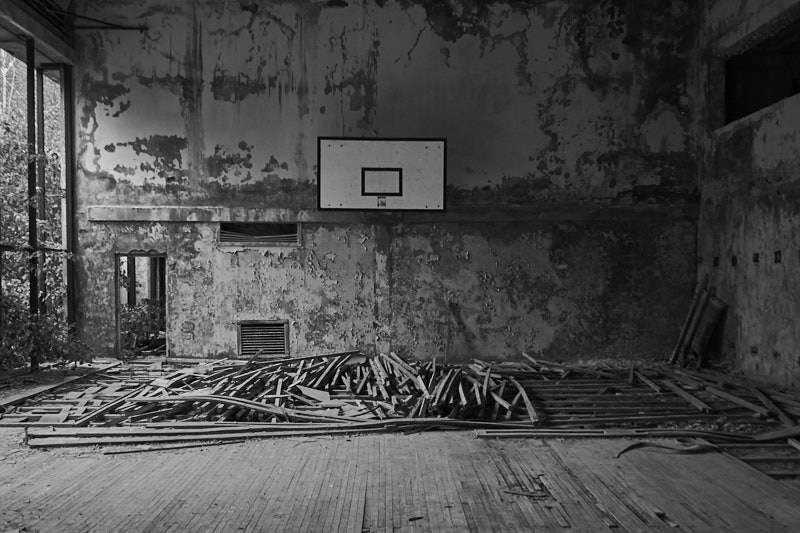
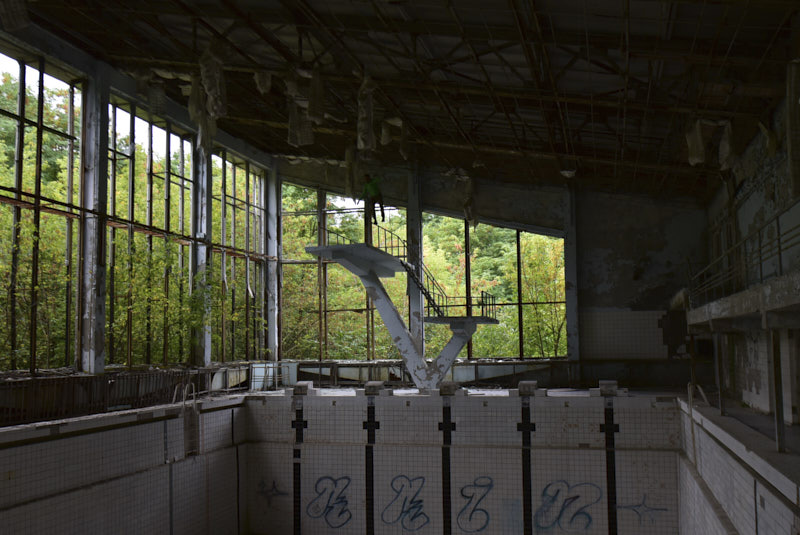
7 The Road
Things were hotting up.
Not long after our 4pm breakfast, the Ukes had spotted a group of figures stood on top of one of the near by buildings. They’d immediately hit the deck and managed to grab a sneaky phone pic of five soldiers looking out across the city. On closer inspection, it turned out these guys weren’t the regular Chernobyl police who had hunted us the day before, they were the proper army. I wasn’t immediately sure what the difference was, but the Ukrainians looked a little more worried than they had done the day previous. A couple of us ran downstairs to clean up all the crap we’d thrown out the window the previous night when we were ‘preparing’ our flat for habitation to make sure no one passed by and noticed the disturbance.
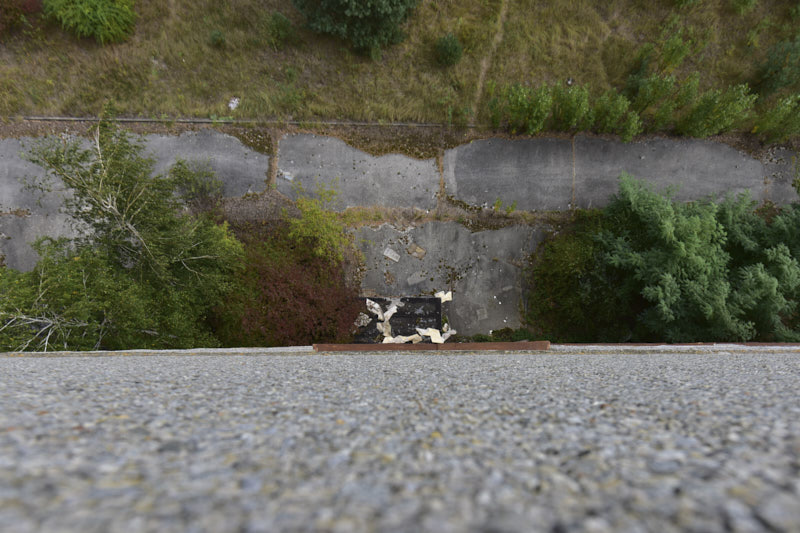
It wasn’t enough to do the sensible thing and stay put though. I figured the best thing to do would have been to keep an extremely low profile and wait till nightfall to move out, but an hour later, they were suggesting we go an watch the sunset from the same block we’d just seen the soldiers on.

The fox that greeted us at the steps to our building as we moved on out towards the evening venue was a funny little chap, happy to take food from our hands and hang around like a house-trained dog.
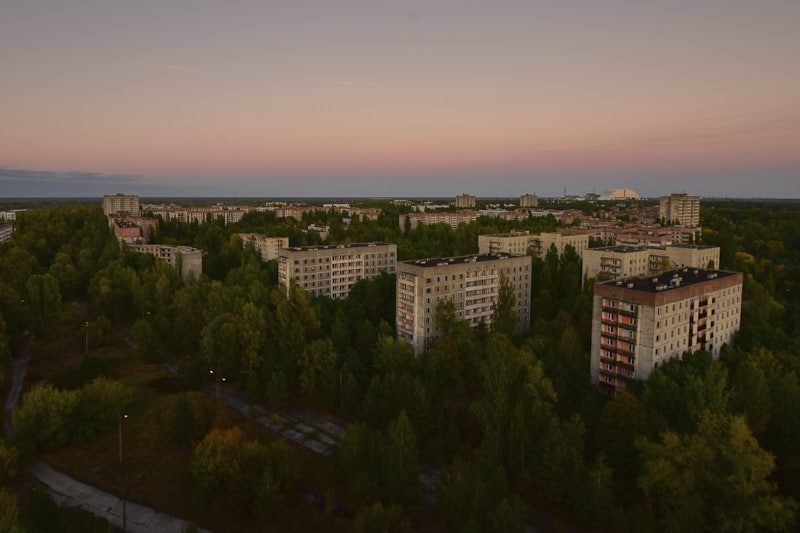
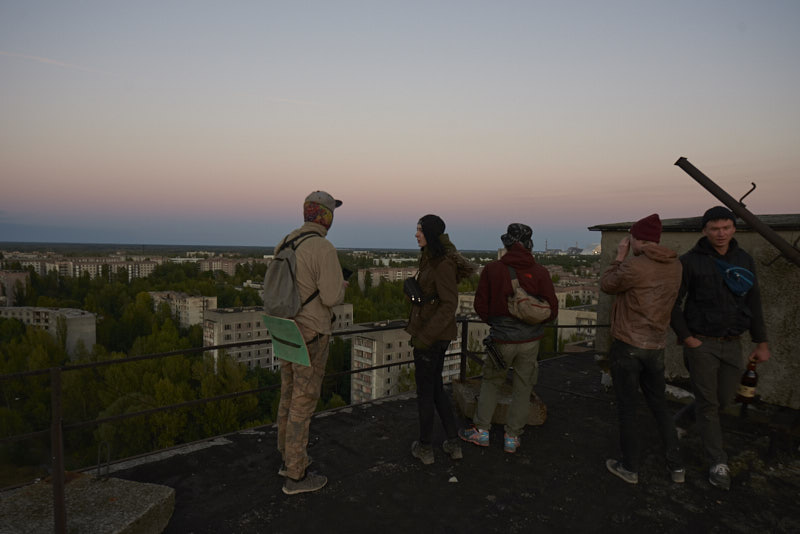
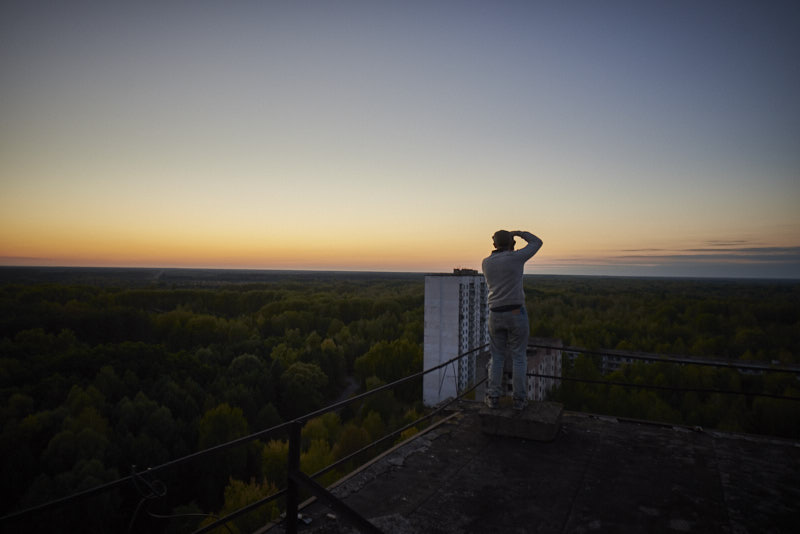
The sunset was gorgeous, and we finished the last of the beer from the food stash and took in the final view of the city before we were to depart. The Cheshire Cat was just finishing off a couple of poser shots for his thousands of instagram followers when we heard a yell from down below.
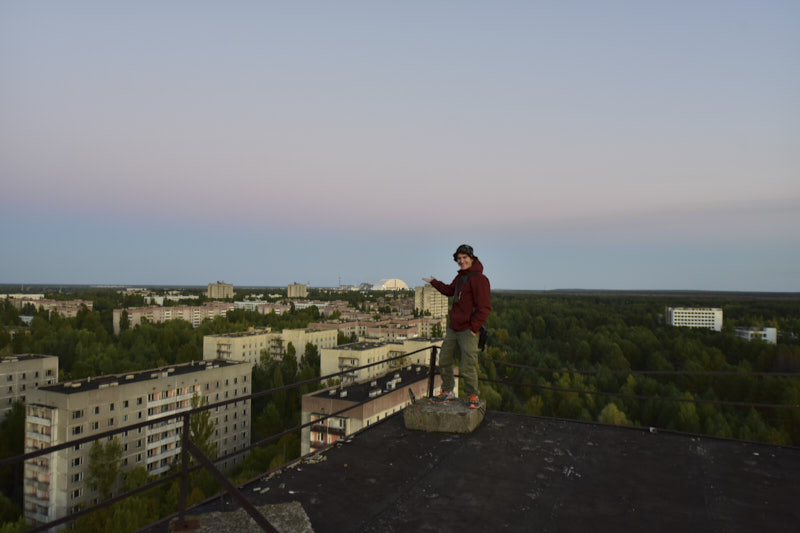
Balls. Soldiers.
Everyone got down but it was way too late, they were on to us. We grabbed our gear and ran down a few floors while we decided what to do. We’d never have beaten them to the bottom, so we opted to wait it out, running to an end room on the 4th or 5th floor from the top and staying silent. I was convinced we’d totally fucked it, and sat there stewing and telling myself that I KNEW we shouldn’t have left our flat and acted like cocky dickheads outside. As before, the room held a divided mood between the nationalities, the Brits sat at the end churning through endless scenarios in our heads for all the extortion and passport confiscation that was about to happen to us, and the Ukes smoking tabs and messing about with their phones.
I’ve no idea how they didn’t find us, but after an hour or so of waiting we counted our blessings and left, hightailing it back to the flat and quickly packing up to get the hell out.
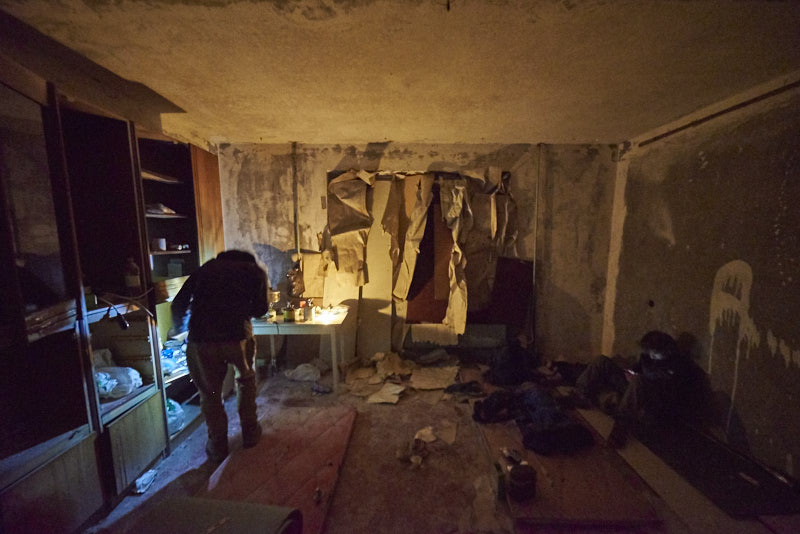
We took a walk south, sticking to the overgrown back roads and paths, and joining the main exit road towards the Red Forest about 300m from the main checkpoint. Walking in single file to minimise our profile we paced it away from the checkpoint that looks out onto the perfectly straight road and towards the famous Pripyat city sign. From here, it was a straight line towards the Red Forest, so called because of the vast amount of radioactive fallout that fell here, which instantly killed all the green trees and turned them red overnight. Even after the liquidators had cut down all the trees and dug up and removed meters of topsoil, the Red Forest is still intensely radioactive. We only stopped our rapid pace for a few minutes to get one last look at the reactor compound through the 75-kv switchyard and catch our breath, but the death-tastic levels of radioactivity here were enough to get us to chivvy on, and before long we were off the main road and in to the woods, towards our next goal of the Duga array.
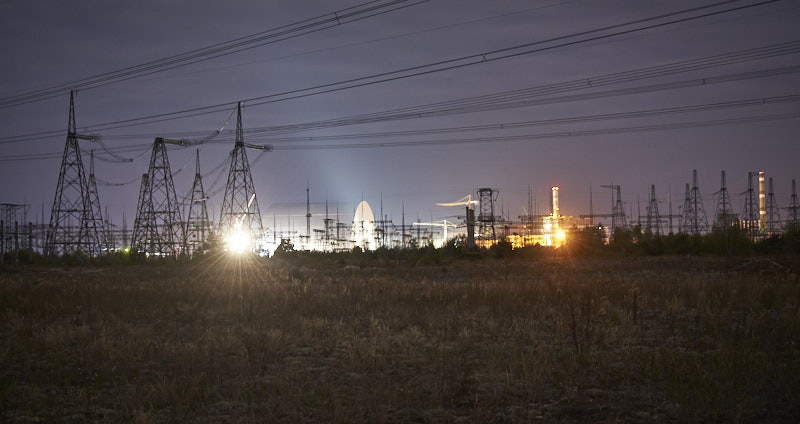
We made a short tea break in an old soviet era bus, left rusting in the grounds of an old farm and the followed the power lines through the dense forest towards Duga.
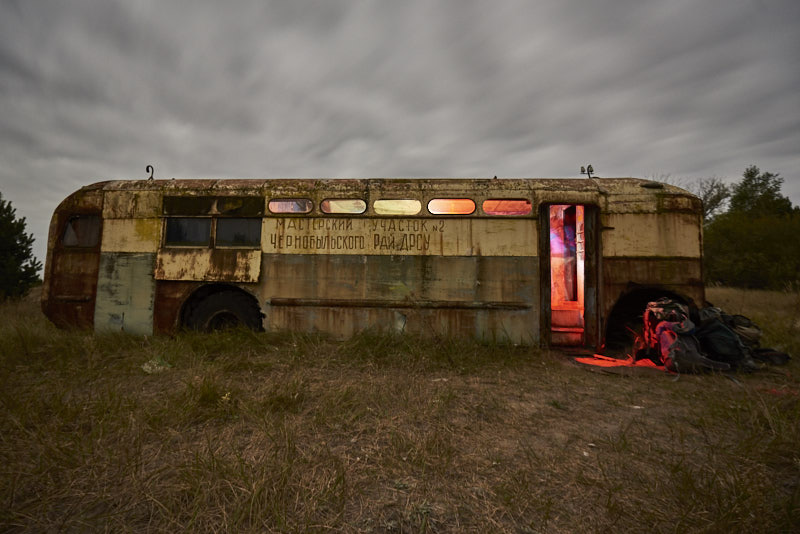
8. The Woodpecker
“Its not Duga 3, It’s Mistake”..
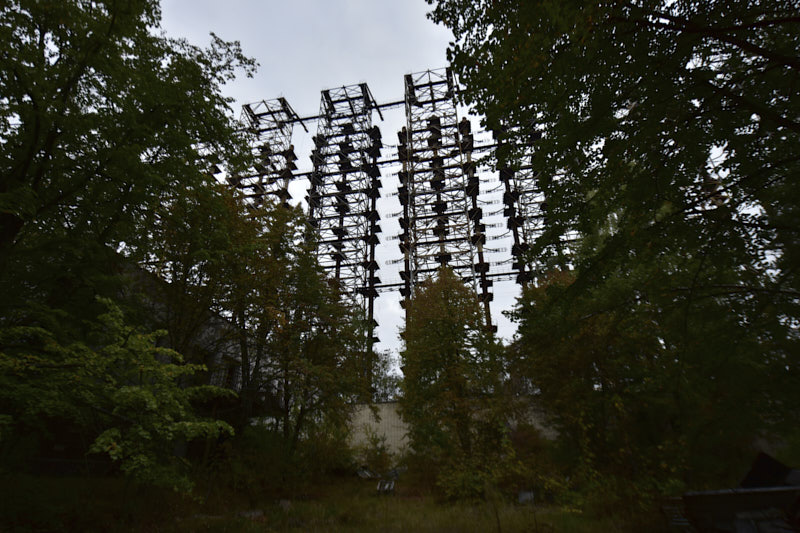
According to the General, contrary to what half the internet seems to think, the 1km long, 140m tall over the horizon radar array we were stood in front of isn’t called Duga-3 at all, its just plain old ‘Duga’. The ‘3’ seems to have crept in from some internet copy/paste translation error or something and has just stuck in the English speaking world, perpetuated by 100s “top 14 extreme soviet structures” articles on Buzzfeed and the like. It’s nickname though, ‘The Woodpecker’ does have some historical base, being given to Duga by the amateur radio enthusiasts of the day, who would hear its distinctive 10hz chirping ruining the radio transmissions for the entire planet when the Russians switched her on.

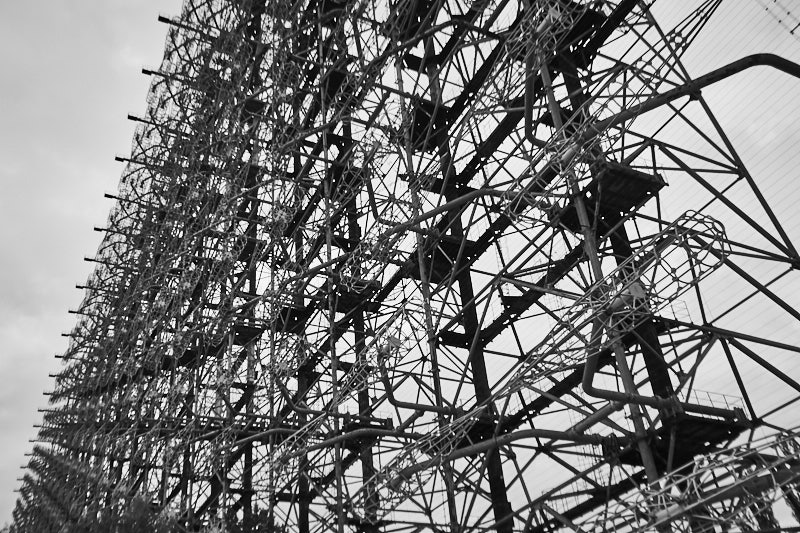

We had one more welcome food stash to grab here, hidden under a panel in one of the enormous control corridors of the building that sits beside it, which we took back to our camp for the night in an old apparatus and command building towards the rear of the Duga site. We were weighing up whether to climb the thing now or after some food and a sleep, but Scharfrichter and Oleg both said they couldn’t be arsed, and offered to cook us all dinner while we went and got busy on the ladders.
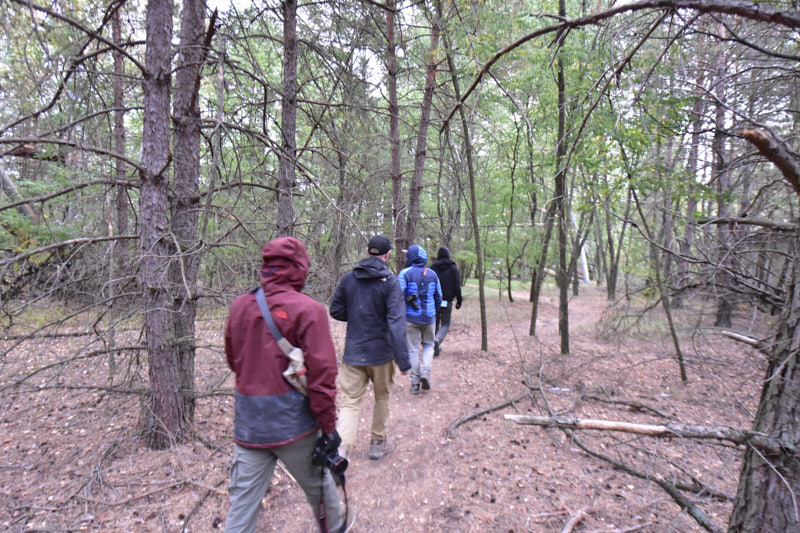
It was fairly straightforward climbing, but the welds on the thing didn’t stand up to too much scrutiny. The horrid rust even got the Boatman flapping, who’d just come back from a few weeks of climbing ‘unclimbable’ rock faces in Greenland, so it must have been awful, but we pushed on all the same and popped out at the top with the whole of the Red forest beneath us. We could see the Chernobyl reactor and the New Safe Containment stretching out 10km to the north, and the massive distances we’d covered in our week in the zone.
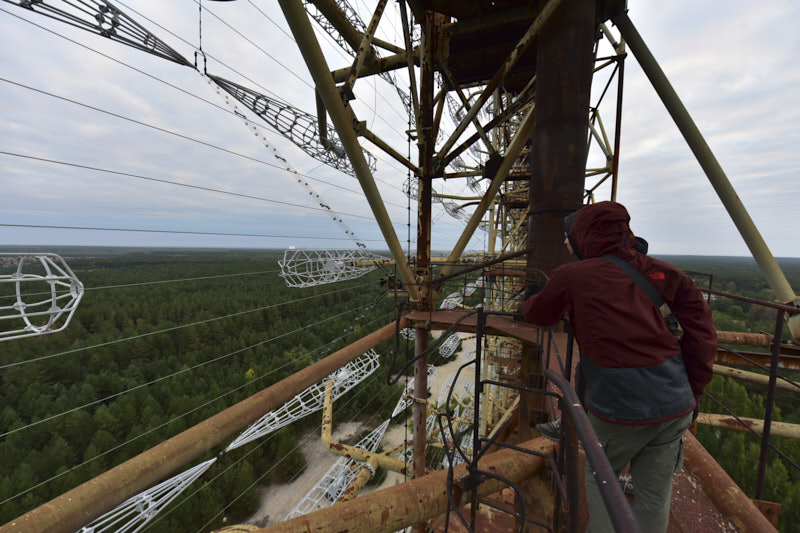
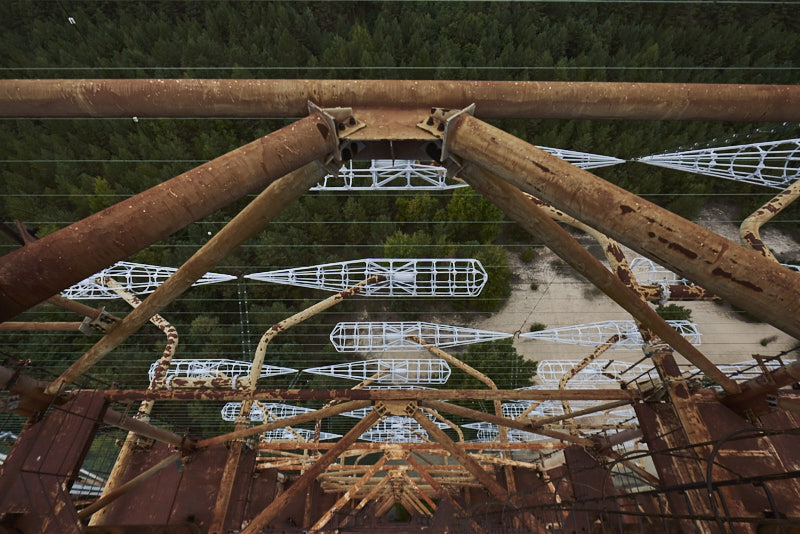
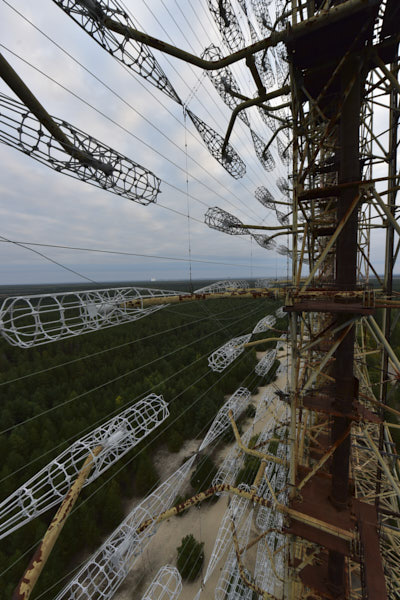
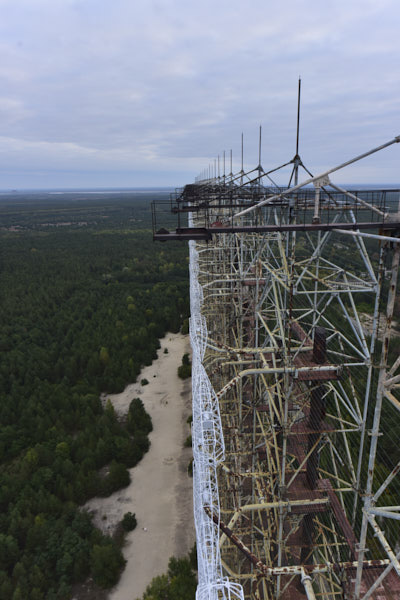
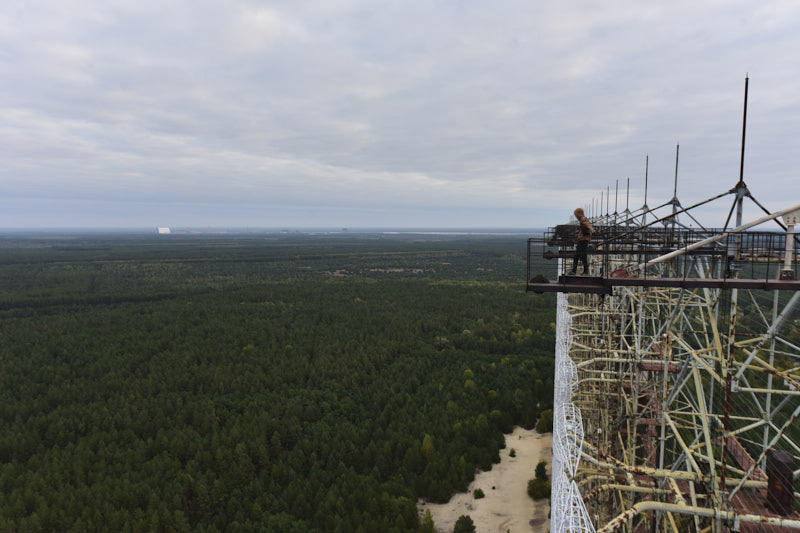
The Cheshire cat had a good play about as well, shimmying out on to the giant transmission beams and getting a good old fashioned dangle pose to keep the instacrowd happy.
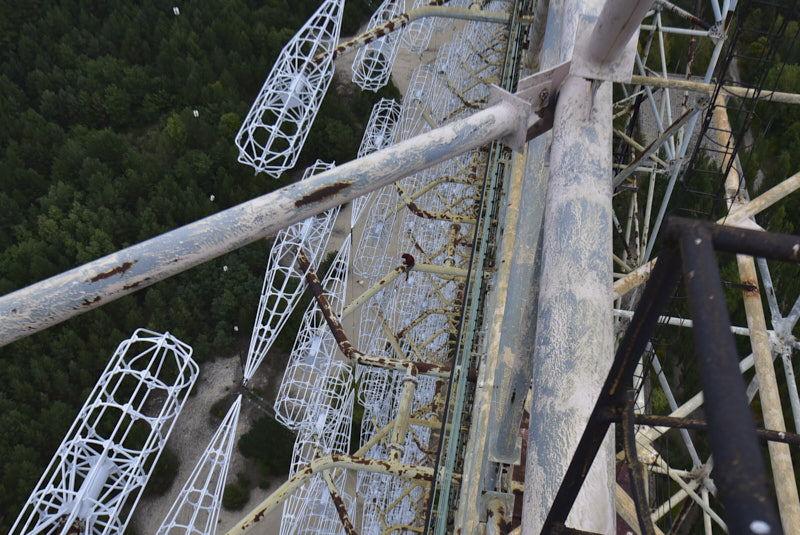
I had a look at my watch, time was most definitely pressing on.
“Don’t worry about the guards, he is a very lazy man. Won’t be out of bed yet”.
I wasn’t too fussed about that, I told him, I was more thinking about the food we had on the stove back at base. I was starving and my legs were killing from all that walking.
We got back to a cracking selection of gretchka, meat, vodka and beer and tucked in for our penultimate supper before we left on the long road out.
9. Dances with Wolves
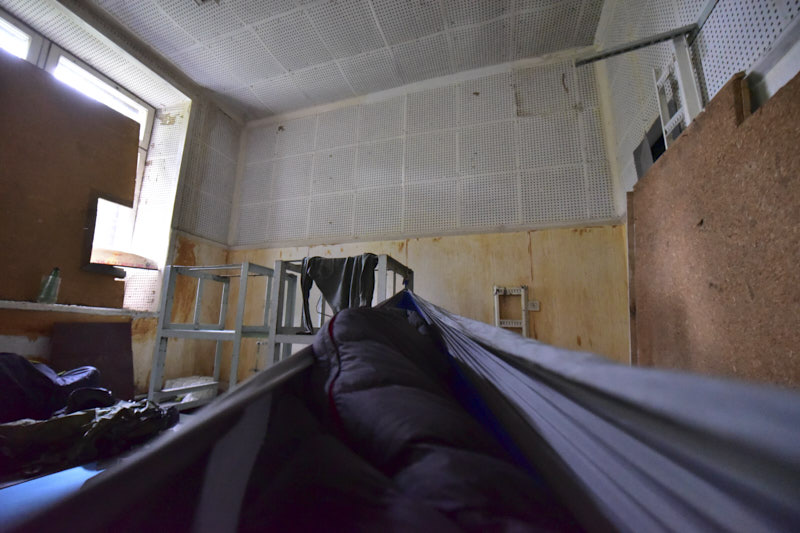 I awoke in the hammock around 16:00, admittedly a bit hung over. Me and the Monkey had finished off the last of the booze on the front step of the building we were staying in (we couldn’t take it with us could we!) and spent hours talking increasing amounts of crap until the super-strength “Descent” Ukrainian special brew ran out. While we’d finished off almost all the beer, we still had quite a bit of food left, so cooked up one last feast in our control room hotel and packed down.
I awoke in the hammock around 16:00, admittedly a bit hung over. Me and the Monkey had finished off the last of the booze on the front step of the building we were staying in (we couldn’t take it with us could we!) and spent hours talking increasing amounts of crap until the super-strength “Descent” Ukrainian special brew ran out. While we’d finished off almost all the beer, we still had quite a bit of food left, so cooked up one last feast in our control room hotel and packed down.
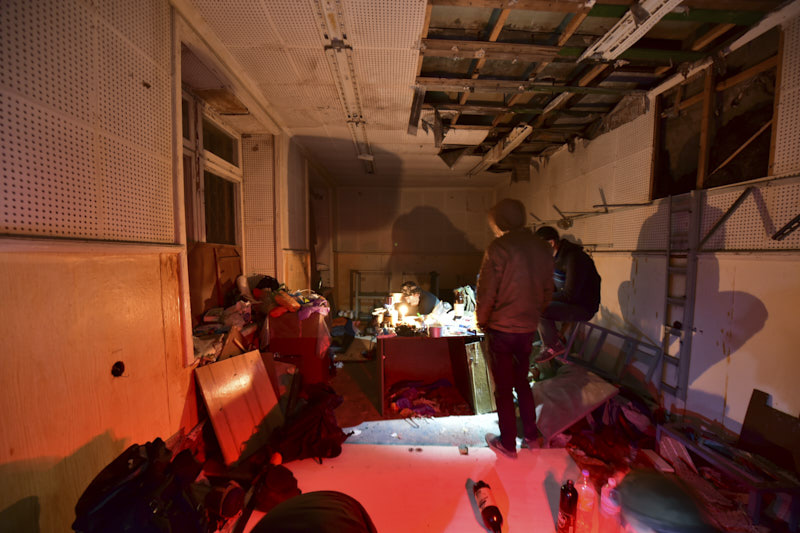
We got back on the forest trails underneath the power lines that used to carry the huge amount of electricity to the Duga array, and made our way south towards the border. The going was slow, and we took a break under a bunch of trees to tip the sand out our boots and smoke a couple of cigarettes. There were a few spitttals of rain in the air, and with the pace we were going we’d never make it back to the first village out of the zone for the first bus out. It had to be this first bus as well, as it’s always the one that has no police on it due to the way their shifts work. If we’d boarded the second or third bus of the day, they would only have to look at us once to realise what we’d been up to, and the whole trip would be in the bin. By this point I was walking with a stick, the ligaments in my knee acting up from an old injury, so there was going to have to be a tactical decision about whether we stuck to the roads or not.
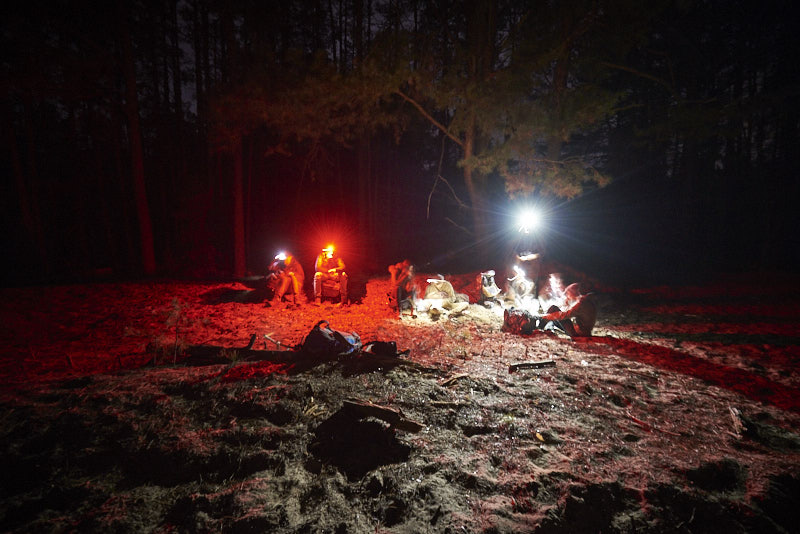
The howl of a pack of too-close-for-comfort wolves didn’t help matters either.
In order to make good time, not get a total soaking from the rain now collecting on the grass and stay out of the territory of this wolf pack, we were going to be getting on the roads as soon as we could.
The howling followed us as we progressed, never getting closer, but always present, as if they were seeing us out of their land and making sure we were gone. On another cigarette stop, the General spoke up after a round of howling.
“It’s Autumn, so we should be OK. They’re well fed. It’s in Winter and Spring when you must worry. Then they are hungry.”

Our last rest before our final sprint out was at a woodmans cottage around 6km from the edge of the zone. We stopped here probably for too long, its comfortable seats and warm surrounds from the now bitterly cold outside was something I could have stayed in for hours.

The last road was torturous. A single, straight, endless line of asphalt cut straight through the trees. We trudged in silence for what seemed like hours, one foot in front of the other, step by step, and became separated. The Ukes, who had packed significantly lighter bags that us Brits, with our big cameras and tripods were storming ahead with a good 300-400m between me and the Monkey, with the Boatman and the Otter bringing up the rear. We’d worked ourselves into a trance by this point, the grey sky, grey road and grey forest all blending into a deathly, indistinctive mush, never seeming to change or move like an endlessly repeating scooby-doo cartoon background. We were looking out for the glinting light of the main control post at the village of Dytyatky, the main road entrance to the exclusion zone, or signal to move off to the side and make our way through the trees to cross the barbed wire fences and exit back into the real world.
Without warning, the road began to glow. We both looked back and saw a pair of headlights storming up the road and dived into the bushes, hoping it hadn’t seen us. It flew past, oblivious to our presence, a bus carrying workers to the nuclear power plant of the first shift of the day.
When we all finally regrouped at the turn off point, we all knew we had to hurry. We only had around 45 minutes to do 4km, and at least 1km of that was going to be through very rough terrain to allow us to leave to road and skip assed the checkpoint 500m ahead of us. We started into the bushes, moving as quickly as we could, but all of us stumbling over the uneven ground, slipping in ditches and in sand. The old barbed wire fence, when we got to it, was showing its age. Whole sections of it had been cut way and re-wried many many times. Crumbling and rusted barbed wire mixed with brand new sections, a valiant attempt at stemming the flow of illegal traffic in and out of the Chernobyl zone, but an ultimately impossible one. We found our gap and all squeezed through on to the road, with a safe 20 minutes for the last sprit to the bus back to Kiev.
We had to move quickly, and I think we all had our heads down when the figure, dressed all in black, hood up and running quickly sped past us, back up the road towards the police check point.
“Zdrasvoutsay”, ‘Good day’, in Russian.
We quickly realised it was a cop, obviously out for his morning jog before starting his shift. We stood out a like a set of absolute melons, 8 people with backpacks and rollmats looking filthy and exhausted. We had to get to this bus before our man made it back to the checkpoint and informed his colleagues what he’d just seen.
We picked up our pace, almost running by this point. This last 1 or 2km fuelled my adrenaline did for my knee, which I couldn’t move for a day or two after. Making it back to the bus stop with 5 minutes to spare, we waiting with baited breath, hoping to hell there wasn’t going to be a set of blue lights hunting us down.
The bus came.
We boarded, elated.
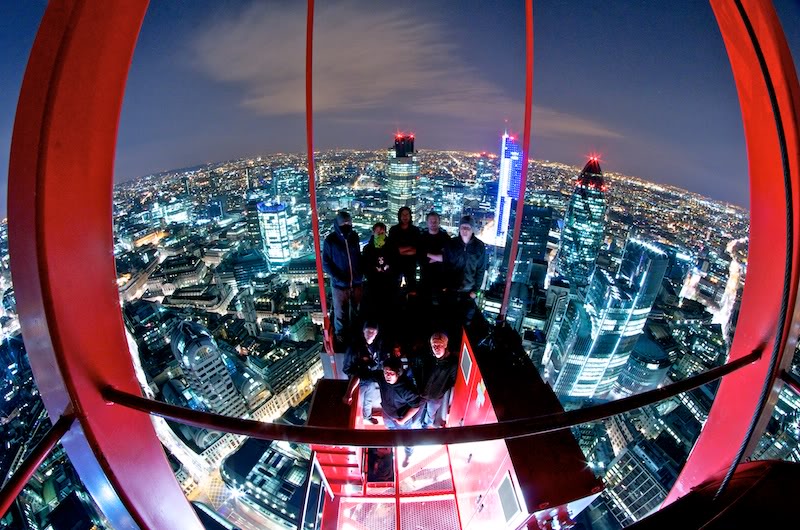
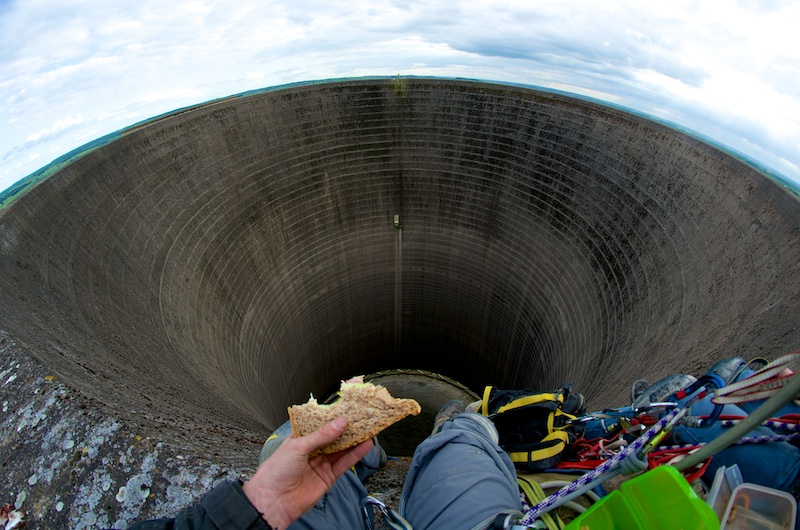
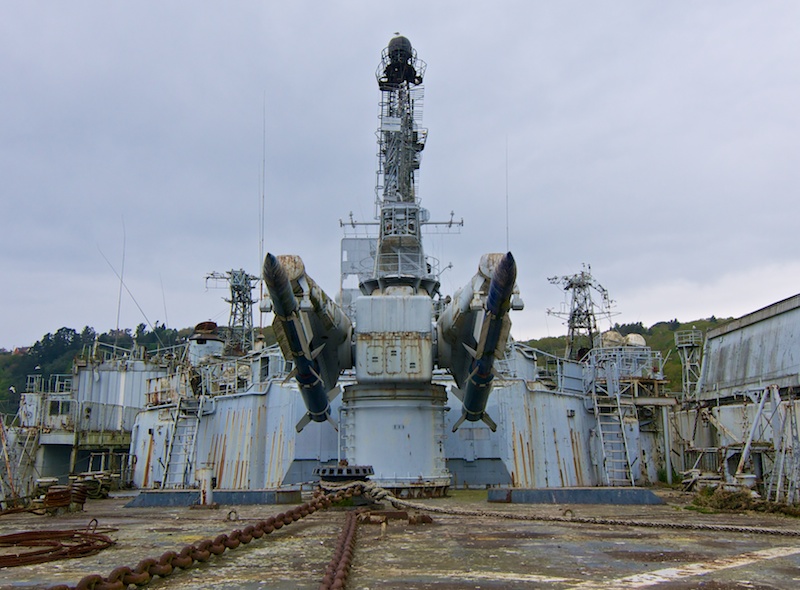
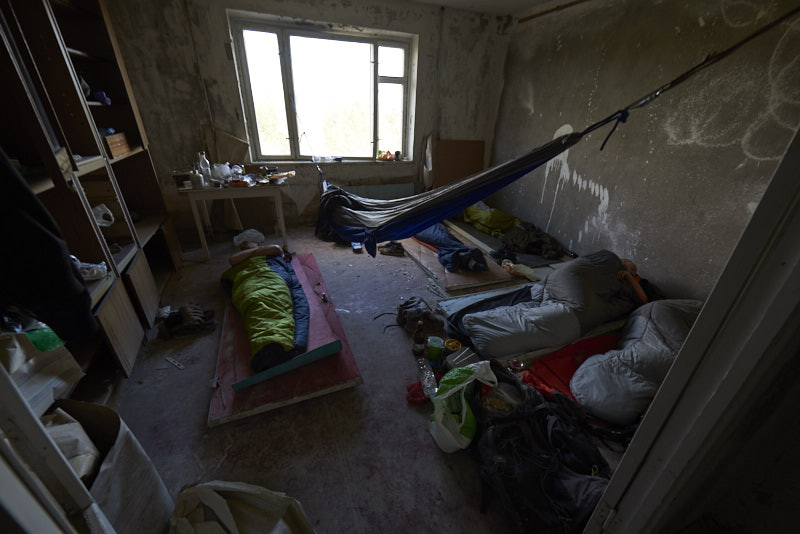

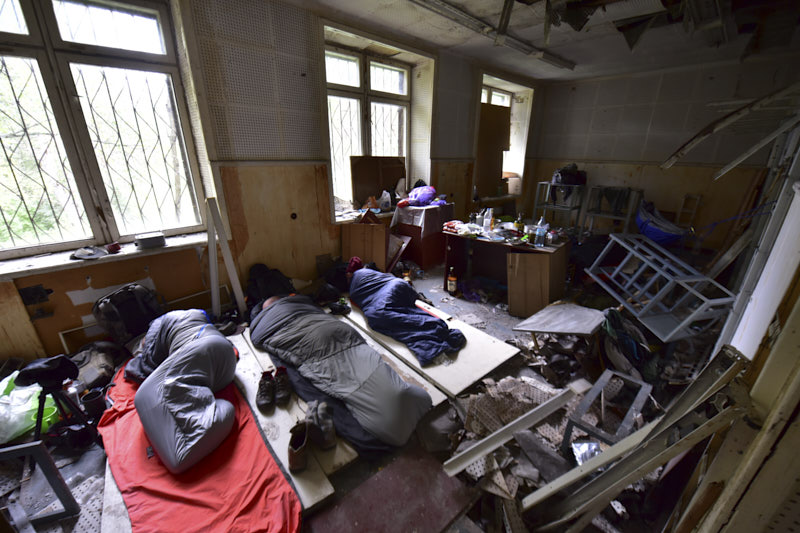

Incredible! I loved reading every word of your adventure! And your pictures are beautiful!
incredible story and picture, thanks for sharing man.
Good story! I actually read the whole thing lol